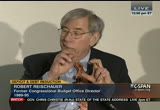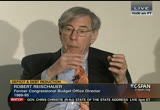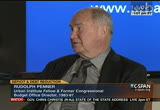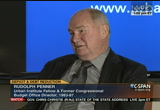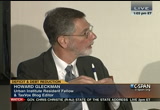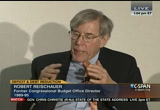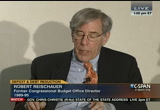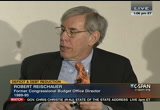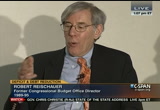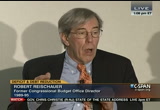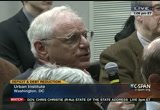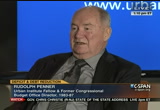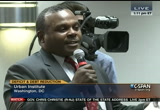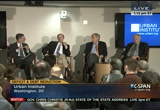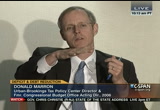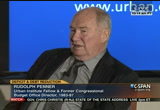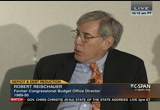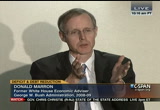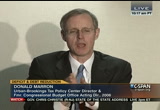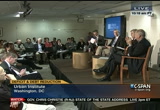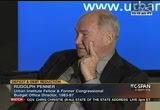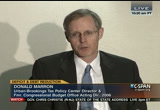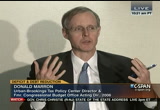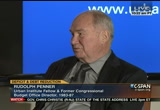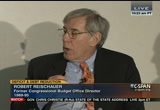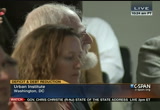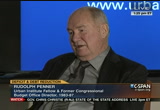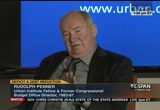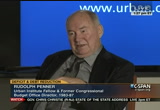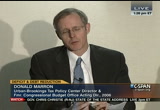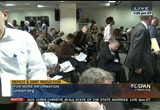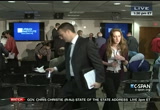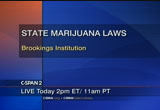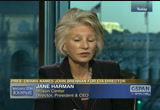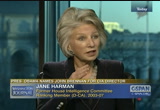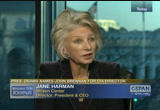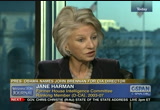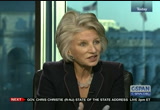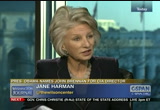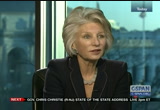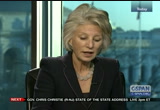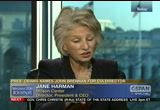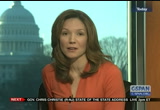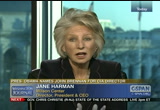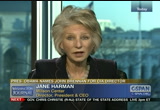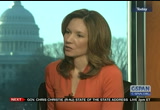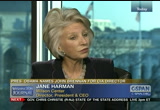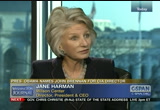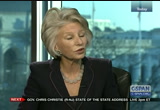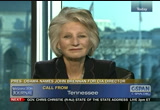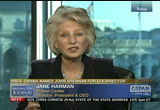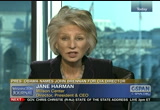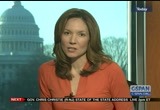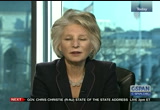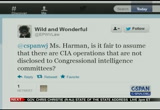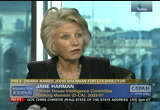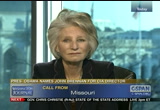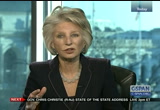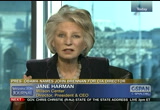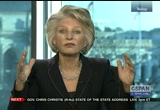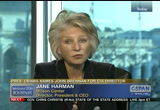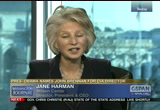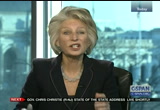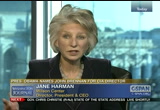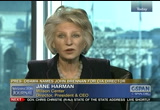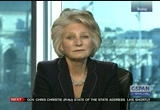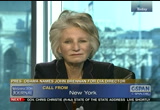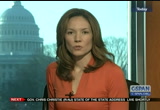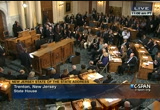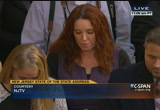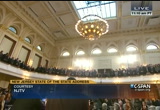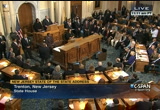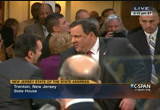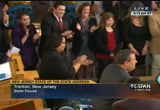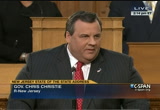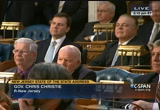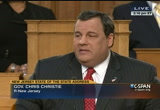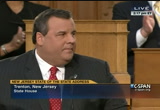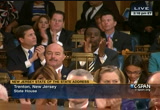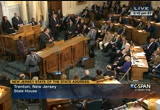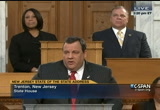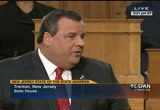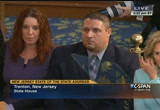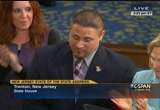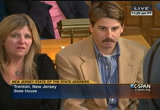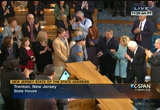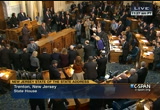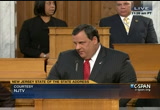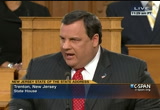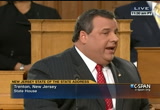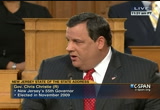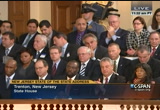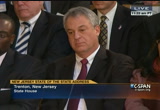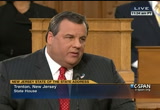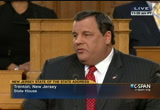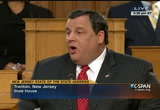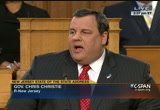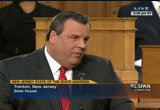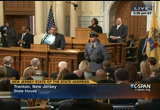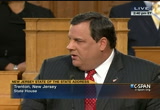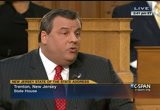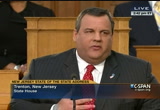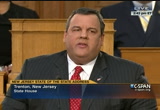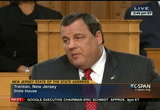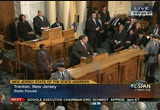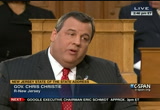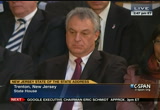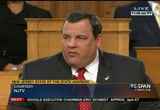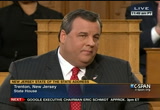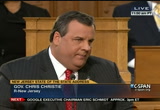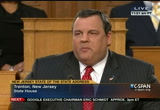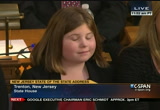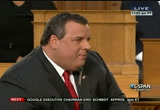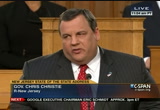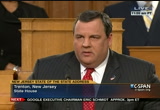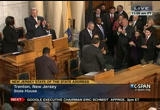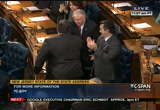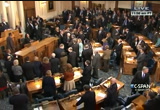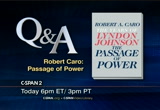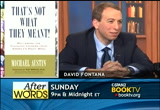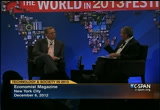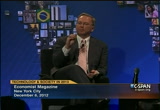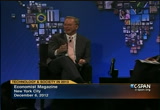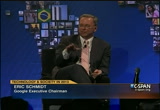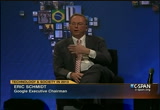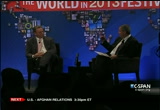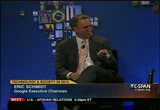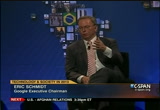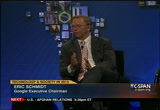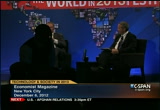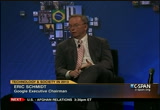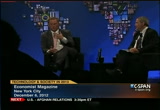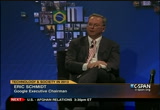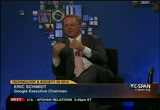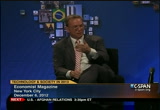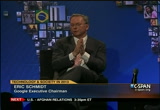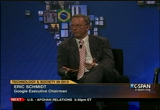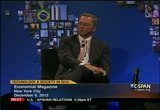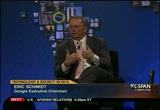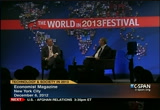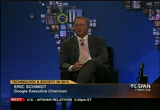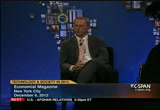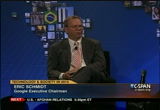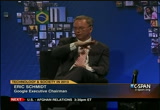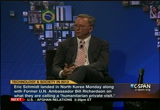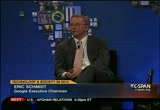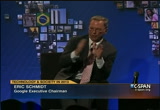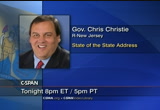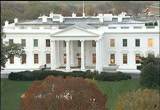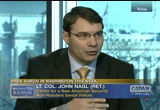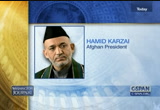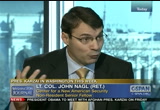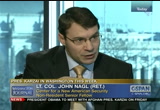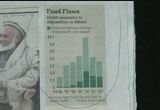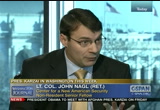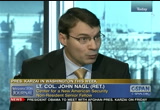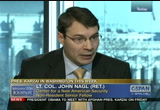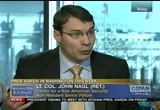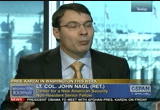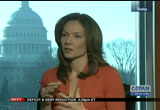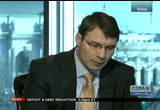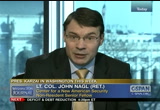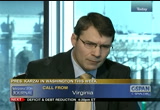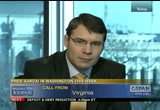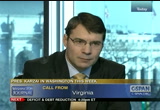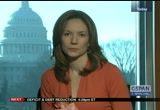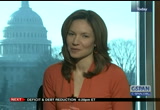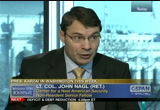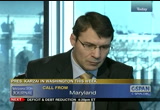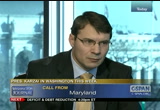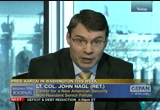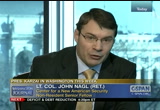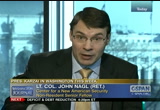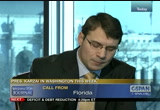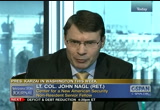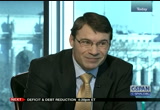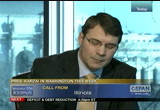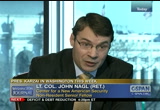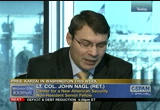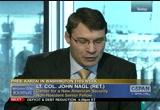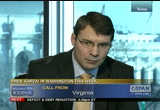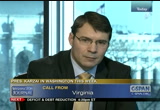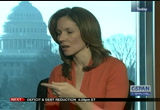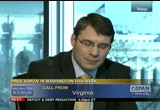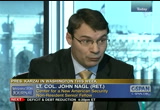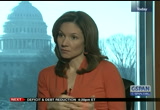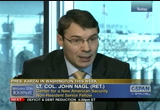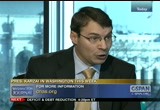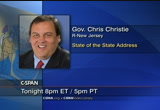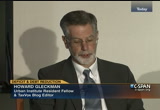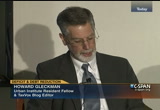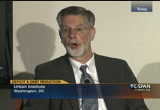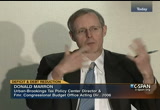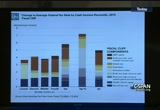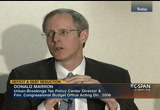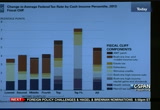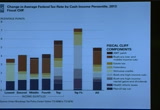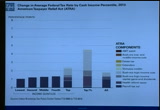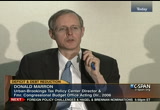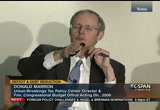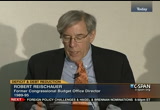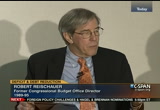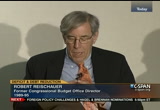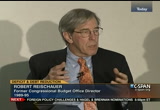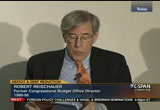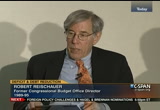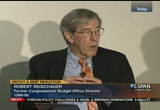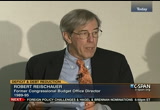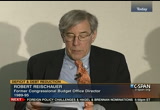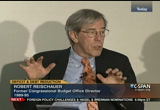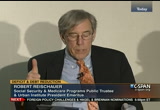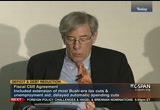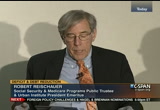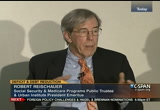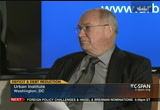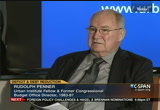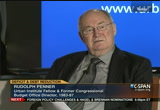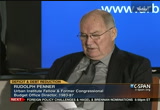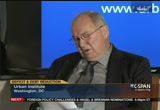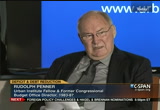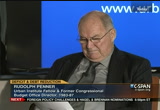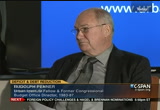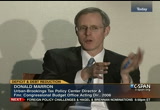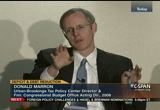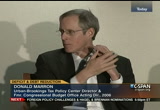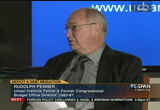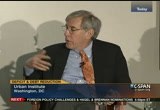tv Public Affairs CSPAN January 8, 2013 1:00pm-5:00pm EST
1:00 pm
made to people's benefits. it may be 3/10 per bed of less. for someone who had been on tenure, the benefits would be three% less. if you say you want to cut benefits, which you say i want to affect at least those individuals who are not dependent on their social security benefits taxed they might be working part time. you look at the person who is 85 or 86 and often, their pension was not indexed for their money.
1:01 pm
their spouse has passed away, they are, in general, tougher and -- financial circumstances. it is not that i would not have some sympathy for changing benefits, but i would like to do is lower the most for those who are most capable of withstanding the reduction. >> what do you say? >> i think the most important point to make about the change cb i is it saves you very little in the long run. it raises you very little on the tax side. if that's the only thing we are contemplating, i guess we talked about eligibility for medicare but we were not talking about sufficient reforms to fix the problem we face. while historically, the chain
1:02 pm
cpi may have gone up by two or three points less than the cpi w use, there is no guarantee. is just a forecast. -- that is just a forecast. we could save more or less depending on how things work out in terms of real reform, i would much rather look at something of this sort that bob discussed, some sort of progress of indexing approach to the problem. that would lower the rate of growth with real benefits at the top more than at the bottom. i emphasize or rate of growth because it the look of the bulls since the proposal, all benefits continue to rise in real terms even among the most affluent. we don't have to impose a huge
1:03 pm
amount of pain to resolve the social security question. >> let's say the best for last which is medicare. it was remarkable that during the entire fiscal cliff debate, the political system was silent on the issue of medicare. there was all this talk earlier by house republicans who voted for a dramatic change in the structure of medicare but during the fiscal cliff debate, over the last month or so, i heard almost no words about medicare. both parties seem to be terrified about even talking about it. what was going on? are there ways to get sufficient money from medicare to address the fiscal issue without entirely reforming the system that? >> it was evident what was going on. social security and medicare must be the two most politically popular programs ever invented.
1:04 pm
they affect a huge amount of people. it really is hard for politicians to attack those programs. know what you do to make reform more acceptable. that is what i am so pessimistic for the long run. i think it will take some sort of crisis to get reforms and those popular programs. >> what do you think? are there ways to skin the medicare cat out committing political suicide? >> the president has proposed three-$400 billion over 10 years of additional adjustments to medicare, expending on some of the ideas of the affordable care act. a liberal organization has put out a plan of equal savings.
1:05 pm
there are ways to do this that don't constitute reform at large. the fact is that when we look at medicare, the growth of spending on a per beneficiary basis is going to be very low over the next 10 year because of changes that were made in the affordable care act. we are talking about growth rates that are half of what they have been historically. it is hard to see how you can squeeze more out of bad in the short run. in the longer run, i think fundamental reforms are possible but the president made this a defining issue in the election.
1:06 pm
to passe was going preserver medicare -- it was unrealistic to expect this would be front and center during the fiscal cliff negotiations. >> the president says he does not favor changing medicare but on the other hand, he says he favors increasing use of managed care. does that go to the same place from a different direction? >> as you know, i have a certain track record with premium support which is actually a label that can of an article that henry aaron and i wrote in 1995. it was a very different approach, not moderately different, from what congressman ryan has pursued. i have a lot of sympathy for moving in that direction.
1:07 pm
in a sensible kind of way and we already have the medicare advantage component of medicare. we are about -- about 1/4 of beneficiaries to to get their benefits through a plan offered by some private entity that agrees to take a risk-adjusted payment to cover medicare desk type benefits for people who enroll in its. . motta fighting that program gradually over a decade i think would move you very close to something that congressman ryan would view as premium support. we're not going to get gobs of money out of it. the real issue is not medicare or even medicaid. it is the underlying growth in health expenditures per beneficiary in the system at large.
1:08 pm
those of us on medicare get their benefits from the same providers and through the same mechanisms that employer- sponsored insurance folks do you have to institute reform or changes in incentives that will lower the growth rate for all americans. that is the only way to be successful unless you think you will shift costs on to medicare beneficiaries and that has huge limitations because the average single person over 65 has median income of about $18,000. over half of the units, a 65- years old and older, are central as opposed to couples. the couple's median income is only $44,000 so you cannot expect to get huge amounts of
1:09 pm
money by shifting costs on to them. >> i will give the audience a chance to ask a few questions. there will be microphones taken around and i would like you to wait until you get a microphone and please introduce yourself and make it a question and not a speech. right back here -- >> i am and dick miller -- what does anybody up there think about [inaudible] i understand the labels and expectations of having people in both houses of congress trying to work across the aisles, people in more of the middle. >> there are many bipartisan
1:10 pm
groups the deployed around. everyone on this panel has participated in some of them. do you see any opportunities at all coming from the stacse? >> ultimately, it is the only way out what we see in the congress is continued polarization and erosion of the blue dog democrats, the moderate democrats and we see, unfortunately, more polarization on the part of the voters, too. that is exaggerated from the point of view of the house by the fact that we are so clever at drawing district lines that we tend to draw them around conservative and liberal bunches. when some congressperson seems to be acting out of the mainstream, he or she may be from the point of view of the
1:11 pm
nation as a whole but from the point of view of their constituents, they are just going along with public opinion. it is very difficult to break through that. >> gentleman in the back -- >> in reading one article, should you die in 2013, it said death taxes went up to 55%. i am very upset with that. i can understand the president fighting with congress because you have campaign contributions and lobbyists.
1:12 pm
why is the corporate tax rate not on the table for discussion? all focuses on working folks and their exemptions and the mortgage and exemptions and also social programs but there is no focus or attacked or evaluation of corporate tax rates in this discussion or even with the congress. >> one question is about the estate tax. maybe you can clarify what the rules are and the other is about the extenders which got extended. >> i will pass on the estate tax but i will focus on the corporate park. t. go back to the presidential campaign.
1:13 pm
you had one candidate, governor romney, who opposed lowering the corporate tax rate from its current 35% some level down to 25 and the other candidate, president obama, the proposed to lower the top corporate racks rate to 25%. it was a strong bipartisan effort in lowering the tax -- the corporate tax rate primarily because of reasons of international competitiveness. the united states is quite out of line with much of the rest of the world about what our tax rate is. on the other hand, we are also out of line on how generous our tax breaks are. what president obama has proposed in broad terms is a rolling back corporate tax breaks as a way to help pay for lowering the top rate. does -- it is something that dave camp and others have in congress have raised for their role is issues about how far we can go and rolling back tax
1:14 pm
breaks when companies and businesses know that what you are trying to do and different businesses have different opinions. the political discussion has primarily been a round revenue- neutral business or corporate tax reform in which rolling back the tax breaks would be a pay for to bring the top rate down. >> do you think there is a way we can do corporate reform in this environment? >> is extremely difficult but i think one really positive thing that came out of this fiscal debates this time is that for the first time in a long time, the business community unified around a concept of getting our deficit under control. they were not as worried about their individual tax breaks that might go as a result of having some reform.
1:15 pm
i hope that mood continues. that was a one group does not argue over one other or about accelerated depreciation and so forth. i am more hopeful that a more unified view from the business community is possible this time. >> i want to say one thing -- i'm not fully knowledgeable about this. i was at a meeting earlier today we're in noted tax expert said you cannot do corporate reform and not to individual reform because when we change the parameters, a whole lot of
1:16 pm
entities shifted from c corporations to other forms that were taxed on the individual side. if you lower rates on the corporate tax and get away with some of the preferences for oil and gas and various things, you'll get a huge shift of people out of the individual and into lower rates in the corporate world and you will lose money. >> this is a very important thing. watch as politicians talk about this and when they use the word corporate and when they use the word business. there are a lot of businesses that are structured as corporations and businesses that are structured as limited liability corporations or partnerships or s corporations
1:17 pm
and the taxation of their income happens through individual tax returns, not for corporate tax returns and some companies have a choice how i want to structure and a base that in part on tax considerations. there's also this issue that many of the tax breaks that applied to corporations are really business taxes. if you start changing those and make them less favorable as a way to raise money, you may also have the effect of raising taxes on the businesses that are taxed on the individual side that we might get the benefit of a corporate tax cuts. you would then run into fundamental economic issues if you are distorting how these companies choose to set themselves up and you begin to run political challenges that if your goal is to lower the corporate rate and paid for by rolling back business tax breaks, the bumper sticker of of what you just did is you have raised taxes on small
1:18 pm
businesses. there is a bunch of things that may not be true in what i just said that that is the bumper sticker that you are walking into. that starts to bring the pressure. >> we have a question from one of our remote of yours. -- remote viewers. let's talk about revenue as a share of gdp. how much could it believably collect in a new tax structure? can we agree? what is a reasonable number? >> oh, dear - first of all, i think you have to separate the revenue target
1:19 pm
from how you face it. there are better ways to raise more money which would not be inefficient. i guess i felt pretty good about the kind of thing that bull's simpson was suggesting. as i remember, it initially was $80 billion per year the. seemed quite reasonable. as we look forward, we will need more revenue than we have collected historical way. as a% of gdp because of what the demographics are doing to a large part of government spending. somewhere around 22% or something like that seems a reasonable goal to me. >> i think that is a reasonable goal in the short term. if i were looking out into 2020,
1:20 pm
i think it will end up being hired. >> you tell me what the spending is and the percentage of gdp and i will tell you two percentage points less, maybe a little closer but people talk about balanced budgets. to get the debt on a trajectory where it stops growing faster than the economy, something like running 2% of gdp deficits on average would be a tremendous accomplishment relative to where we stand today. we will ultimately have to calibrate our tax revenue juxtaposed to spending. does not necessarily just a matter of rolling back tax breaks and the justing been known pieces of the tax code. thinking about things like carbon taxes and what not may be essential.
1:21 pm
>> they are applying spending in the 25% range? is that credible? >> we could design a tax system to support them. it is hard to skill what we have currently has an income tax to accomplish that. you would have to reduce deductions a lot. internationally, there are a bunch of countries that have larger governments than the united states. that has to do with financing and health care but some has to do with other things. if you compare their tax codes, on average, they choose tax consumption more heavily relative to income than we do. there are a lot of good economic reasons why tax consumption makes more sense than taxing income. it seems the political economic pressure is if you want to
1:22 pm
support a larger government, you have to have a more efficient tax system and that means getting rid of distortions and taxing consumption and relative terms and the u.s. would have to find a way to attack there. there is value added tax as a way to get there. i am firmly of the belief that we end up in a corbett -- carbon tax before we get to that. >> as somebody who designed a consumption tax once, do you think we are reaching the limits of the income tax? will we have to raise revenues somewhere else? >> i used to think that politics would push us in that direction. frankly, as hard as reforming the personal and corporate income tax is, coming up with a new tax at this point in time, i think, is totally unthinkable from the republican point of view. i cannot imagine doing it within the next 10 years or so.
1:23 pm
>> my observation is to not ask the question -- what percentage of gdp will total spending be -- what will happen to health care costs in the next decade and a half. if we get it under control, i think our numbers could be significantly lower. what we have seen over the last three or four years is very optimistic in the sense that health-care cost growth has slowed down. we have been there once before and it did not pan out. i am a believer that there are a number of forces that should make us more optimistic now than we were the last time this happened. >> other questions from the audience?
1:24 pm
>> i am >gruenberg. the whole point of the fiscal cliff and trying to get the deficit down long-term -- you have not talked about the other obvious thing which is jobs. this is a tax panel but if you put people to work, they earn money, even at government jobs. if they earn money, they pay taxes, if they pay taxes, revenue goes up on the top -- and the deficit goes down. talk about jobs. >> talk about growing our way out of the deficit? >> everything you said is true. growth is beneficial but the net benefits are much lower than many people realize. the problem is that we have
1:25 pm
designed a system where we have, for example, indexed initial social security benefits to wages. that means that the faster the economy grows, the faster wages grow, the faster the cost of our promises of growth. with health, is more obscure but i think the evidence is fairly clear that people have more income, they demand more health care. as a result of that, if you grow faster, there will probably be more pressure on health-care costs. while growth has a net benefit, you cannot solve the budget problem with realistic rates of growth. we have to grow at chinese proportions to be able to do that. with what is possible in the united states, it would benefit
1:26 pm
and i don't want to deny that but we cannot grow our way out of this problem. >> another question from the audience? yes, sir >> thank you. we talked about how congress and we talked about the white house. what implications does fed policy have far -- for our economic future? >> mr. bernanke? let me put it this way -- i cannot believe that the quantitative easing we have had has done all that much good. i think the facts must be trivial on interest rates.
1:27 pm
and the effects of liquidity i think are pretty trivial given that the banking system has been using their excess reserves. i don't think it was worth the risk of the exploding the fed balance sheet, a balance sheet that will have to shrink or the long run or else we do create the risk of more inflation. i wish the fed had not done all of that. i guess i am not as concerned as my people are that they will make a huge mistake as they begin to straighten out their balance sheet. it is hard to believe they can do it with precision to come to a perfect outcome. they are bound to make a mistake one way or another. making a mistake in a more contraction our direction is just as probable as doing it in
1:28 pm
an inflationary direction. the risks are there and i don't think the risks are high but i don't think it was worth doing what they have been doing. >> can lay on the wind it? >> i am a little bit more charitable. i agree that the impact has not been huge and i would not want to be ben bernanke's successor. [laughter] >> i will be the most positive. the risk profile is that it is much worse to do too little than too much. for idiosyncratic reasons in the middle of the financial crisis, the federal reserve got no authority which is a new tool it has to combat inflationary
1:29 pm
pressures whenever that time comes. that time has not yet, when it does -- while they still have taken their balance sheets to unforeseen levels, i think the reality is that ben bernanke or his successor will be in a strong position to combat any inflationary pressures that may come down the road. are tepid recovery has been leading to the side of doing more. >> we will end on a relatively optimistic note. thank you very much to all. [applause] [captioning performed by national captioning institute] [captions copyright national cable satellite corp. 2013]
1:30 pm
1:31 pm
and about 30 minutes, we will bring you chris christie and his state of the state address and he is expected to talk about the federal funding for hurricane center relief efforts. last week, the house approved over $9 billion in flood insurance agent lawmakers will take up an extra $50 billion in the coming weeks. the state of the state is at 2:00 here on c-span and also at 2:00 on c-span 2, a discussion on the discrepancies between state and federal marijuana laws despite passage of laws in colorado and washington state. it continues to remain illegal under federal law leaving over -- leaving open the possibility of prosecution by federal laws. that is the 2:00 p.m. eastern on c-span 2. the president named john brown and his -- as national security adviser and we talked about this morning.
1:32 pm
host: we are back with former congresswoman jane harmon. let's begin with the pick of john brennan. why do you think the president chose him? what does this job entail? guest: he has been in the catbird seat for four years. he was going to be the pick four years ago and his name was withdrawn at the last minute. as the guy in the white house, he managed our counter- terrorism program. he worked well with president obama. he is the guy obama trust most and this is a sensitive post at a very sensitive time. i think it is an extremely good appointment. host: what does the job entailed? guest: the director of the cia is different than what was before 2004. in 2004, four of us in congress, led the fight for intelligent
1:33 pm
reform and we've restructured our intelligence committee after the bad intelligence on iraq to have a joint commander. person is called the director of national intelligence. the current one is james clapper, a former three-star military man from the pentagon. under him are 16 intelligence agencies and the cia is one of those before that, the director of central intelligence had nominally have the coordination role. now, the cia is one of 16 but it is our primary spy agency. its role under the reorganization has become even more crucial. if you have seen "zero dark thirty," it shows the central the cia played in identifying the career and once we identified him, we found the
1:34 pm
house in about a block and then we found osama bin laden. host: senator john mccain said he wants to take a closer look at the interrogation policies of the bush administration and john brennan's involvement in that. guest: i applaud with john mccain said about interrogation. he has been saying for ever that torture does not work and he should know. he was in the hanoi hilton for so long and tortured by north vietnam during the war. he is right, in my view. i did serve on the intelligence committee for eight years. i was there in the 1990's and came back and was a ranking member. i think we should look at interrogation policies and look at detention policies and we should look at drone policies. before this nomination, john
1:35 pm
brennan asked to come to the wilson center which i now head, he asked to comment talk about the legal framework around drone policy. it should not be our foreign policy. it is a tool but many of our tools should be developed through prom -- diplomacy and soft power and john brennan understands this. one thing i hope he will do after he is confirmed, and i predict he will be, is take a fresh look at the cia mission, reduce the paramilitary part of that mission, that should be offloaded mostly to the pentagon with the exception of an intelligence function. arrest of the things the cia does should be more conditional -- the rest of the things the seat a dutch to be more conditional. host: are you talking about drones? guest: the cia has a huge role in our use of drones.
1:36 pm
it follows very careful legal steps. some can disagree and i disagree with portions of it but what i am saying is the role of the cia in executing drawn missions should be reduced. i think drawn missions over time to be reduced. the pentagon to be the place where military and paramilitary activities are launched and directed. the intel peace can happen at cia, at the operation of drones, it should move out of the cia and move to the pentagon. host: who makes the colonnade drone attack? guest: ultimately the president does. these are highly secret missions. a lot of the preparation happens at a lower level and the call about whether to use a drone in a particular strike happens a level below the
1:37 pm
president. i believe it is classified. host: what about foreign policy challenges in 2013 for john brennan if he become cia director? guest: the cia is not a foreign policy role. what the director and the agency is supposed to do is speak truth to power, collect information, predict information about the future. it is not a scientific agency. it is an analytic agency and they predicted agency so that policymakers can make the best decisions, something i used to say is that good intel will not guarantee right policy decision of a bad intel is more likely to feed a wrong policy. host: are talking with jane harman. former member of the intelligence committee. the phone numbers are on your screen.
1:38 pm
we will get to your phone calls in a minute but i want to get your reaction to what john brennan had to say when he came to the microphone yesterday about talking with congress. [video clip] >> while the intelligence profession demands of secrecy, it is critically important that there be a full and open discourse on intelligence matters with the appropriate elected representatives of the american people. although i consider myself neither republican nor a democrat, very much look forward to working closely with those on both sides of the aisle. host: what did you hear there? guest: i heard a very important statement. during my eight years on the house intelligence committee, i was frustrated often by the lack of full information from our intelligence community to
1:39 pm
congress. congress is an independent branch of government. we are the ones who authorized legislation and appropriate funds and we need full information to do that adequately. we did not get it especially in the first half of the bush administration. we did get some information. i was in the so-called gang of eight. there was enormous frustration with the amount of information we got. john brennan understands that has to be corrected. it has improved over recent years. i think the current members of the house and senate intelligence committees will find a good partner in john brennan. going forward, if he decides to restore the cia mission to a more robust, non-power military
1:40 pm
mission, he will need the collaboration of congress. host: how so? guest: i don't know what he would propose but i think we need a new legal framework for these post-9/11 world. we have pieces of policies that are cobbled together -- the foreign intelligence surveillance act was updated, the patriot act is highly controversial and that was passed after 9/11 and has been amended since and some parts expire and some don't and it all sort of works but there is still serious issues about detention and interrogation policies. i strongly agree with john mccain about that there are other issues about how we do the intelligence mission now. we don't have enemies to wear
1:41 pm
uniforms, who attacked us in some symmetrical fashion on battlefields in nation states. we have rogue actors to act across borders. we have cyber attacks. have a series of different challenges. i think we need a new framework and i think john brennan, my guess is, will want to look at that. i have been a member of the cia and external board. if i continue in that position, i would want to contribute to a group that would try to think ahead on that. maybe it will need more legislation and john brennan would work closely with congress to get that host: here is your first phone call from chicago. caller: just touched on 2009 and it was controversial to have john brennan as cia director because he supported rendition and drones which were part of the radical bush administration
1:42 pm
programs that the democrats criticized at that time. now, obama has institutionalized of those programs. i am very concerned because there is no dissent on those issues. i have another question for you -- guest: the precise circumstances of john brennan's withdrawal -- i don't know them. i think they will come out in the confirmation hearings. the charges against him, some of them, from what i recall -- i think were not completely fair. you just heard me say that i think we need a clear legal framework around interrogation. congress has already banned torture which is something i supported and voted for. i think we could do an even better job there.
1:43 pm
as far as rendition, my understanding is that we don't do renditions. there was an article that i read recently in "the washington post" talked about the practice that i did not think conform to the old version of renditions. if there are things going on that can be discussed publicly about this subject, i'm sure they will be brought up in the confirmation hearings and it occurs to me that there may be a classified portion to those hearings. i don't know but i hope you will agree that some aspects of our intelligence mission must remain classified because sources and methods can be compromised. i think the legislative committees have a right to know about those things in the right way. i think putting all that in our newspapers and on the airwaves can get people killed and we
1:44 pm
have to be very careful. host: from twitter -- guest: i don't know. i think he is a capable man and has been the acting director. i interacted with him in my role as a member of the external committee of the cia. i think he was very gracious yester day when john brennan was nominated. that is not an easy thing to go through. i don't know what his position was on john brennan has been senior to him in the obama administration. he has the president's absolute trust. he is a very talented cia -- host: what you think the impact has been on the cia? guest: david petraeus is a genuine american hero. i do not condone what he did. the president had the right to
1:45 pm
accept his resignation. having anyone leave abruptly causes dislocation in an institution. he stepped into the shoes of the director and i think manage things very well. a lot of the policies started by david petraeus will be continued. one is to take a look at women in the cia. there was a committee that david petraeus started and it was under way when he resigned. host: that brings up a headline in "the washington post." guest: as i said numerous times, security is a women's
1:46 pm
issue. we are lionesses. we are well qualified to sit and any policy table anywhere. many women are. nobody missed the groundswell for the secretary of defense. there are lots of qualified women. four women head the 16 intelligence agencies now. there has never been a woman as head of the cia. i do not see a barrier that a woman cannot meet or overcome. host: your name was floated for
1:47 pm
the post. guest: very flattering. john brennan is an obvious pick and i support him. i do not know how my name was put out there. i hope to play a role and support as we look at our intelligence mission and if he asks me as head of the nonpartisan wilson center, which focuses on aligning scholarships and policy. we are in a good position to marshal expertise. host: intelligence policy is our topic this morning. democrats, 202-585-3880.
1:48 pm
republicans, 202-585-3881. independents, 202-585-3882. james has been waiting. caller: thank you for taking my call. it is a strong delight to see you looking marvelous as ever. guest: you are just great, james. caller: i followed you i never it house hearing you participated in. you were just marvelous. there is no limit to your honesty. i am a proud vietnam veteran. i served when chuck hagel and his brother were there. what is it you can see that
1:49 pm
causes such a rift with the republicans went a democrat chooses a republican such as mr. chuck hagel. he has so much significant qualifications and knowledge of congress. that is the key thing. what: i guess we'll see the objections to a hagel are. i think hagel is a sound choice. i think the president has every right to nominate chuck hagel for this position. some statements he has made in the past need to be aired. my guess is that he will be confirmed by a large margin in the senate.
1:50 pm
the secretary of defense does not make foreign policy. the secretary of defense plays the primary role of bringing our defense department to bear to the service of the president. most people believe his qualifications are sound. he was a decorated hero, enlisted man in the vietnam war. there never has been an enlisted man like him as secretary of defense. the issues he is going to confront our budgetary issues and how well we can fund the pentagon and how we can cut back on certain aspects of the budget.
1:51 pm
that will be very tough. i agree with chuck hagel there are some things we can cut. we need to cut with a scalpel and not a sledgehammer. the threats against us are serious. we need to cut the legacy systems and put in more limited amount of funds in the right places so we can protect our country. host: we will talk about the pentagon budget and what they faced with these spending cuts as well as the secretary of defense chuck hagel and his thoughts about the pentagon.
1:52 pm
bobbie is next, republican caller. are you with us? caller: good morning. i like to welcome the guest. thank you for the opportunity. your guest was in a legal turmoil about representing, was scored on a wiretap with two agents that were caught spying on america. that is all i have to say. guest: that was report it six years ago and reported again in 2009. it was a political smear. i have it in writing that i was never the target of any investigation. unfortunately, these days people who do not wish you full success are able to make charges and sometimes those charges have a shelf life. if you haven't brought it up, i would guess nobody else would have remembered it.
1:53 pm
i'm happy for the opportunity to respond to you. host: this comes from twitter. guest: the answer to that is yes. if they fit the definition of covert action, they have to be disclosed to the so-called gang of eight. the gang of eight is the leaders of congress, minority and majority leader's. i was in that group from 2003- 2006, which was a turbulent period for us. this letter was declassified. i wrote a letter commenting on so-called enhanced interrogation techniques in which i was briefed and asking the general counsel to the cia for what was the policy guidance that he had when we were all very scared about the future of the country. i told the cia not to destroy any videotapes that i had heard had made of these techniques. the videotapes were destroyed. host: hi, dan. caller: hi. yes, but if they fit the definition of covert actions, they have to be disclosed, the
1:54 pm
so-called gang of eight. the national security act set up our defense and intelligence community structure. the gang of eight is the leaders of congress both the minority and majority leaders and leaders of our intelligence community. that is eight people and i was in that group while i was a ranking member of the house intelligence committee from 2003-2006 which was a turbulent period for us. in that role -- this letter was declassified so i can talk about it -- i wrote a letter commenting on so-called enhanced interrogation techniques. i asked the general counsel for the cia to brief me for what was the policy guidance we had.
1:55 pm
we were all very scared about the future of our country and i raised the question of who approved these things. i also told the cia in writing not to destroy any videotapes. so we could look back and see what happened. in violation of my request, the video tapes were destroyed. host: independent caller -- in regards to some terminology that she has used several times this morning. legal framework. that sounds kind of vague. i wonder if jane can be a little more specific about what she means. as the law is constructed, are there some restraints that she does not like that she would
1:56 pm
like to see changes? i do not know why she wants a new legal framework. maybe so different agencies can interact differently. guest: thank you for that question. i have been a little vague. i'd like to explain that better. our constitution provides that in order to surveil a person, an american, you need an individualized warrant. otherwise you're doing and unconstitutional search or seizure. if we intercept messages are get meta data, what and perhaps some of those involved
1:57 pm
1:58 pm
other issues need updating. i would like all the policies to hang together -- how we detain people and learn about their communications with other people, how long we can preserve data is another issue. policy has been changed to lengthen it. i think that could use more public scrutiny. put it all together. this is the 21st century version of a set of u.s. laws that comply with our constitution that we can explain to the world. why is all this important? the way we will win against this challenge of terror is to
1:59 pm
win the argument. we have to explain ourselves and live our values andone of our values is abiding by the rule of law. we have to be able to explain our laws. clearly to other people and that's why i thinkdoing this will help us conduct ourselves better and will help us win the argument with others who may try to blow up themselves and innocent people, or whether they should join society and may be hope for a better world. host: tj on twitter says --
2:00 pm
hillary clinton will testify about this before she steps down from that post. guest: i think the senate has every right to demand -- to expect people to testify about what they know a lot lessons they are learning from this. it was a horrible tragedy. there is no such thing as 100% security. some of our diplomats who go outside the walls of embassies, they will be in harm's way from time to time, but no one is defending the set the policies we had our around benghazi. i applaud the clinton for wanting to testify on her watch. she looks great yesterday. i hope she is well.
2:01 pm
i have worried about her health for years because of her punishing schedule. i think she will testify and we will learn what she knew, what she thinks, and the state department -- because i served under foreign policy board -- has taken a set of corrective steps, and they will never do perfectly, but we would do substantially better than we must do substantially better. host: the pictures of her meeting when she received a helmet from her staff as well as a football jersey with the number 112, the number of countries she has visited as secretary of state. guest: i am up there as she is, and no sleep, beating on airplanes, not enough exercise is not a good recipe to stay healthy. hillary, are you listening to
2:02 pm
me? host: independent caller in georgia. caller: thanks. i want to ask if she would elaborate on how john brennan will orient the cia to meet the obama administration's haitian tilt? also, in western and central africa, how she intends on tackling that? guest: good questions. the cia does not make foreign policy. it is the president and his cia dean who has decided to refocus ali ina, and also in m al particular, a failed state, where we believe a lot of terror organizations are in training. these are important things to do. the cia pastoral is only to provide intelligence about these parts of the world, not to make
2:03 pm
policy. i have worried over the years and i'm betting that john brennan has, too, that too much of our intelligence is tactical, focused on who is coming over the next hill, on the battlefield. we surged -- most of our intel assets into afghanistan and iraq over recent years, or about how those wars would come out, and it is a good idea to restore some of our focus on other parts of the world, including asia. i hope our rebalance -- i am speaking as a former policy maker and someone who has a policy institution -- i would hope this rebalance toward asia will not focus on how we make relationships with china and others more difficult. i hope it focuses on how we join
2:04 pm
with the region to create a larger trading relationship with the united states, and to understand better ways in which we can become closer friends with china and friends with the region. i think that will be in everybody's interests, and to the extent the cia gives us information about leadership changes -- there have been leadership changes in japan, china, and south korea in the last six months -- and better information about other trends, then our policy in asia will be better and hopefully again more conagra. host: we have 10 minutes left. jane harman has served as the ranking member of the house intelligence committee. she is nowhehe director of the wilson center. lynn that in new york, republican column, you are up next. caller: good morning. i have a three-part question. i would like to have really
2:05 pm
fast, short interest so i did not take a lot of time. guest: come on, linda. caller: what changes would like to see me to our constitution? guest: in this area of intelligence or defense, i am not recommending any. i would like the equal rights amendment in some lifetime, but i do not know if that is ever going to happen. caller: what should be the response of americans to the united states' supreme court comments onberg's u.s. constitution should she be removed from the bench for pricking her oath of office to uphold and defend it? guest: not sure i understand
2:06 pm
that. reads bitter ginsberg is a very competent and conscientious woman. if you're talking about the egyptian constitution, the one just ratified, that is up to them. there are issues about that constitution. some of the phrasing is very vague, and it matters who will interpret the constitution. i have been to egypt three times in the last year, very interested in the transition, and have urged both sides, the morsi government, and the so- called liberal secular is, the other side to, to improve their political skills so they can deal with each other better and make some compromises. i would offer that advice the united states congress. host: linda, you have one more point? caller: that did not answer my
2:07 pm
question. you took a lot of time sidelining my question. what should be done about ruth ripping of our's constitution? guest: you can understand i misunderstood your question. i do not recall that statement -- >> you can see this program on our video library at c-span.org. we're going now to trenton, new jersey, with governor chris christie giving his state of the state address. this is live on c-span. [captions copyright national cable satellite corp. 2013] [captioning performed by national captioning institute] >> resolution on the clerk
2:08 pm
desk. >> calling for a joint resolution to receive the state of the state address from the governor. >>, i move the resolution. >> the resolution is moved. second ed. all in favor signify by saying aye. ayes havfe it. i now recognize the senate majority leader representing the 37th legislative detector -- district. >> i move the joint session of that 215th legislature comes out of order. >> i recognize the majority leader from camden county kerry >> i second the motion. >> all those in favor say aye. ayes havfe it.
2:09 pm
i am advised by the secretary of the senate and the clerk of the general assembly that a quorum is present at this joint session. please rise for the invitation to be delivered. -- the invocation to be delivered. >> let us pray. we thank you for this day. we thank you for all the things you have done for us and we keep asking you to continue to do great things for us. we ask you to bless this assembly in a mighty way. give us what we need. lower us down into the wells of your wisdom so we will do what needs to be done. thank you, and bless each and everyone assembled. from those that are great to
2:10 pm
those that are small and little, we asked you touch in a mighty way. give us the strength to run this race just a little while longer. bless those that are sick among us. thus those who have lost their lives. bless those who are struggling day-by-day. give us the strength to run on just a little while longer. i know you are able to do everything but failed. blessed us on this day. bless this assembly. plus the state. blessed us as we move forward to do your will and to your work, and we ask you to just bless us, keep us, and we shall be [indiscernible] in the name of the father, son, and holy spirit, we prepared, our souls says amen, amen, amen,
2:11 pm
and god bless america. >> thank you. please remain standing for the pledge of allegiance. >> please join me. i pledge allegiance to the flag of the united states of america and to the republic for which it stands, one nation, under god, indivisible, with liberty and justice for all. >> thank you. you can be seated. i recognize the president of the new jersey senate, presenting the third district, senate president stephen sweeney. >> and speaker, i wish to inform the joint session that the governor has arrived. my colleagues, honored guests, ladies and gentlemen, it is my honor and pleasure to present the governor of the state of new
2:14 pm
thank you very much. thank you very much. thank you. thank you. thank you all very much. thank you. and you all very much. lt. governor guadagno, madam speaker, mr. president, members of our congressional delegation, members of the supreme court, members of our legislature, and fellow new jerseyians, since george
2:15 pm
washington delivered the first day of the union, in new york city on this date in 1790, there has been the tradition of executive leaders to report on the condition of the nation and a state at the beginning of a legislative year. today it is my honor and pleasure to give you this report on the state of our state. one year ago, we were scheduled to gather on this second tuesday in january when air friend and colleague alice pass it suddenly the night before. this caused us to delay this report. i mis alex, and i think of him often in this job. i am so pleased to see his wife here as a duly elected member of the assembly. she continues his hard work in honor of his memory.
2:16 pm
thank you, betty lou. [applause] three months ago we were proceeding normally with our lives getting ready for a national collection and the holidays to follow. then sandy hit. sandy was the worst storm to strike new jersey in our history. 346,000 homes were damaged or destroyed. nearly 7 million people and over 1000 schools were without power. 116,000 new jerseyians displaced from their homes, 41,000 families are still displaced from their homes today. sandy have damage to our homes and infrastructure, but it did not destroy our spirit. the people of new jersey have come together as never before
2:17 pm
across party lines, across ideological lines, across ages and races and backgrounds. from all parts of our state, even from out-of-state. everyone has come together, so today, let me start this address with a set of thank yous for me on behalf of the people of this great state. first, i want to thank the brave first responders, the national guard, and emergency manager experts who prepared us for this storm and kept us say in its aftermath. [applause] i want to thank the members of this legislature for their cooperation in answering stand challenges and for being
2:18 pm
by my side as i toured the devastated areas of my state. thank you, members of the legislature, for standing together for the people of new jersey. [applause] i want to thank the community food bank of new jersey, the salvation army, and the american red cross who help us deliver over 1 million pounds of food and over 5 million meals and snacks to families who needed them. they are part of a network of organizations, family, really, who make life better in new jersey every day, and they really came through when the times were tough test. thank you for that. [applause] i want to thank the new jersey business and industry association, the state chamber of commerce, the commerce and
2:19 pm
industry association of new jersey, and the national federation of independent businesses for keeping us in touch with the needs of small businesses in the wake of the storm, so under jersey can get these businesses back on their feet as soon as possible and working again for the people of this state. thank you to those great organizations. [applause] i want to thank the 17,000 out of state utility workers who came to newark jersey from all over america. you saw them. in their trucks, on your streets, and they joined with 10,000 of our own to get power restored as quickly as possible so that within nine days of this horrific storm, and a creek power had been restored to 90% of new jersey's customers. let me thank all the governors,
2:20 pm
republicans and democrats, from across of america is that utility workers here, and let me thank those utility workers who worked 18 hours a day, seven days a week to make sure that new jersey got back to normal. [applause] i want to thank the members of my cabinet and my senior staff four days before the storm and weeks after put their own personal losses aside and worked 18 hours a day and slept very little. they led their departments and their dedicated colleagues in putting the safety and well- being of others ahead of their own. new jersey and i were both well served by these great, great groups of public servants. thank you, all. [applause]
2:21 pm
to everyone who open their homes, who assisted senior citizens, who fled their neighbors, who counseled the grief-stricken or pitched in to clear debris cannot remove sand, or to get a school back open, i say thank you to all of you. you have defined new jersey as a committee, when faced with adversity, rolls up its sleeves, gets back to work, and in word and deed shows that new jerseyians never, ever give up. make no mistake about it. we will be back and we will be back stronger than ever. if the spirit of new jersey, our community, was shown in the days immediately after the storm. in seabright, mary was at the side of one small business man when he was allowed to return to his business and cboe for the various first time but sandy had
2:22 pm
done for his rest rock. as applied board was pulled off of his building, allowing him to see the complete destruction of his means of earning a living for himself and his family. he turned to marry and said, without hesitation, do not worry, we will build this back better than it was. his words were forceful. they were optimistic. they were emblematic, capturing the indomitable spirit of this great state, and he was just one example of how new jersey and its citizens were showing our whole country out to bravely and resolutely deal with the crisis. citizens like frank smith jr., who volunteered in a first aid squad appeared his home was destroyed during the storm. then his headquarters word during the storm. securing the safety of
2:23 pm
his children, he led his teams to fire and flood waters, to buildings and trailer parks, and he saved over 2000 lives that night. [applause] menocee citizens were saved because he put them first ahead of himself. frank is here with us in the chamber. please stand up, frank, and let us thank you for your bravery. [applause]
2:24 pm
in toms river, marcia an emergency room technician had the day off when sandy hit her home town. she could have gotten herself to say and forgot about her colleagues at the medical center, and most important, her patience. instead, facing several feet of water on her flooded street, she swam -- she swam to higher ground. then she hitchhiked with a utility worker from michigan and got to the hospital and put in a 12-hour shift, treated her fellow citizens who were harmed by the storm, swimming through floodwaters to save lives. marcia is here, please stand up for letting us say thank you for setting such a great example. [applause]
2:25 pm
tracy jay watched as the floodwaters consumed their town. concerned about j. paul's father, they try to reach him but could not. not content to wait, they put on their wet suits, got in there rowboat, went and rescued jay's dad. that would be a great story to if it ended there, but that was the beginning. in the process they saw dozens of others stranded in their homes, so after they got jay's father, turned back around and one by one circus -- saved more
2:26 pm
than 50 of jay's father's neighbors, along with their pets. then for those they rescued who had no place to go, they housed them as well. they admitted they did not know then that well before the storm, but they did not care. they extended a helping hand in a crisis head of social comfort. tracy. jay -- tracy and jay are with us as well. i want to thank them for making a difference. tracy and jay? [applause] new jerseyians among the toughest, most generous people
2:27 pm
in america. these citizens are just a small example of that simple truth. our pride in our state in our moment of loss and challenge is reflected in the eyes of these extraordinary people. some things are about politics. sandy was and is one of those things. [applause] these folks stand for the truth of that statement. now, i am glad we have our congressional delegation for
2:28 pm
being here, but we look for for what we hope will become quick congressional action on a full sandy aid bill and to enactment by the president. [applause] we, as a state, have waited 72 days -- seven times longer than the victims of hurricane katrina waited. one thing i hope everyone in america now clear intent understands, new jersey, but republicans and democrats, will never stand silent when our citizens are being shortchanged. [applause]
2:29 pm
the people of new jersey are in need, and not from their own actions or from an act of god that delivered a natural, human, and financial disaster. let me say on behalf of all new jerseyians we are thankful to the people of the united states, because i know they will honor the tradition of providing relief. we stood -- we have stood with the citizens of florida and alabama, mississippi and louisiana, iowa and vermont, california and missouri in their times of need. now i trust they will stand with us.
2:30 pm
[applause] so make no mistake, new jersey's spirit has never been stronger, our resolve never more firm, our unity ever more obvious. let there be no mistake, there is much that lies ahead. it'll take years to repair, but here is some of what we have done already. we have created a cabinet-level position to coordinate efforts across every agency. markets here today, and he is ready to work with you on this
2:31 pm
restoration effort. we have requested the federal government to pay 100% of the costs of the civic debris removal that we require. we have already seen $80 million for the municipalities for that task. we have secured $20 million from the federal highway administration for the emergency repair of our roads, bridges and tunnels, a down payment on the major infrastructure tasks ahead. we have directed our department of environmental protection to streamline approvals for restoring critical infrastructure. we have overseen the removal already over 2.5 million cubic yards of debris. 17 towns have already completed debris removal. over 1000 trucks are working daily to continue debris removal with 26 more towns rapidly moving toward completion. where now removing debris from
2:32 pm
our waterways, and new jersey ians need to know this. nearly 4000 vessels were either second or abandoned in our waterways during sandy. in one town alone, 58 buildings and eight cars were washed into the bay. we will remove this debris and we will triage the bay to reduce the risk of flooding and improve the health of the bay, and we would do this the same week, this week, thisat this legislature enacts the topps fertilizer lot in america. -- law in america. [applause] we have helped get temporary rental assistance to 41,000 displaced families and where necessary to secure a transitional shelters and hotels
2:33 pm
or motels. we have worked with the small business administration to secure nearly $189 million in loans for thousands of home and small business owners, and to our new jersey economic development authority, which provided lines of credit for businesses awaiting ensure its reimbursement, job training, and benefits for displaced workers. our new jersey department of transportation has been one of the busiest agencies. they have removed over 4400 truckloads of debris just from state and local roads. they are in the midst of cleaning another 4300 truckloads of sand to restore and replenish our beaches. the department of education has worked night and day to give schools -- to get schools reopened as quickly as possible, and where not possible, to get them restored by the next school year, while maintaining our commitment to full 180-day school year of
2:34 pm
education for all of new jersey's children. executive order one of the seven says when interest payments, they are not compromised by excessive deductibles, and will ensure citizens maximize their reimbursements from companies. while there are dozens of other examples of the never quit attitude of this administration and our citizens, there is none better than the merkel of route 45 in manalocee. the bridge had been completely washed away. i stood at the spot where the atlantic ocean flow into the bay, and once carried thousands of cars of days to vacationers down the shore. within days, the commissioner, the department of transportation, and our private sector partners and had a temporary road built to allow mercy vehicles onto the island. now nearly 10 weeks after the
2:35 pm
storm, you see a permanent route 35 already been rebuilt. that is what an effective government can do. that is what it determined people can do. and that is how and where we will lead new jersey in the months and years ahead. [applause] there is no question that sandy hit us hard. there's no question that we're fighting back with everything we got. sandy to make sure it -- it took a toll on new jersey bust economy as we were coming from the recession disrupted our economic life. factories could not produce. for those things we can catch up and we are catching up. as common sense would tell you, sandy kurt new jersey's economy.
2:36 pm
some losses we will never get back. electric power that was not produced, visitors that did not come to power the scene is. sandy cost us 8000 jobs in november. we are relatively fortunate. louisiana lost 127,000 jobs after hurricane katrina. sandy may have stalled economy, but there is evidence that new jersey has not let it stop our turnaround. is the latest news did the unemployment is coming down, and 2011 was the best private- sector job creation in years. personal income set a record for seven years in a row. sales of new homes are up. consumer spending is up. industrial production is up.
2:37 pm
since i took this office, presentation in new jersey's labor force is higher than the nation's, and the number of people employed has grown as well. that means more people have the confidence to be looking for jobs and more people actually have jobs. in total, we have added nearly 75,000 private sector jobs in new jersey since we took office in 2010. i mentioned the word private- sector advisedly. we have not grown government. on the contrary, we have gotten our house in order by keeping our promise to reduce the size of government. in the last three years, we have cut more than 20,000 government jobs. in 2012, we have fewer state government employees than at any time since governor whitman left office in january of 2001. we promised to reduce the size of government, and we have delivered it and held the line
2:38 pm
on taxes paid the of also help line on spending. we have made new jersey a more attractive place to grow businesses, grow jobs, and raise a family. this legislature knows the history well. in 2010 we faced a $2 billion budget deficit. only five and a half months left in the fiscal year when we got into the office, and the balance the budget with no new taxes. in 2011 the picture was worse. the projected 11 bid dollar deficit on a budget of 29. dollars. the worst of america. in total we cut 832 programs, each department of government was reduced, and an 8% cut in spending in real dollars spent. with this legislature possible, we balance the budget without raising taxes. because we have made the tough choices before, last year's budget was easier.
2:39 pm
we not only balance the budget, but began to reduce taxes by enacting the first year of jobs- creating small business tax cuts in new jersey. meanwhile, we devoted a record amount in aid to schools in new jersey. in the budget which governs the current year, even with growth in the national economy slowing, which have been able to achieve balance with not only no new taxes, but with a second year of small business tax relief. that may make this point. clearly and unequivocally, despite the challenges that sandy presents, for our economy, i will not let new jersey go back to our old ways of wasteful spending and rising taxes. we will deal with our problems, but we will continue to do so by protecting the hard-around money of all new jerseyians. we will not turn back. [applause]
2:40 pm
our handling of the budget is one example of change, but i told new jersey had arrived with our inauguration. i have come to this chamber in the year since that day urging us to do the big things to transform our state, to make the tough decisions we have avoided for for two long. we asked this in the context of a state where only 29% of our citizens felt that government was moving our state the right direction in january of 2010. we asked this while the citizens of our country watched a dysfunctional, dispirited, and distrustful of government in
2:41 pm
washington, baker and battle, not against our problems, but against each other. against that backdrop, few would have bet on us. few would have bet on the new jersey. leading the way to restore people's believe that government could accomplish things for them. here we are. three years later and look at all of those things some called it impossible in this town that we have made a reality. a real 2% property-tax cap, interest arbitration reform, pension and health benefit reform, teacher tenure perform, higher education restructuring resulting in rutgers now being in the top 25 in research dollars in the administration -- in the country and a new member of the big ten. new capital investment in our universities for the first time in 25 years, a contract in newark that finally acknowledges
2:42 pm
merit pay. three years ago, and national reputation for corruption and the vision and waste. today, a national model hope for reform at bipartisanship and leadership. that is today's new jersey. [applause] ba now -- that's reviewed this new reality specifically, specifically. to remind our constituents and ourselves how far we have come. add to resolve never, ever return to the cold dark days of our past in this town. years of balanced
2:43 pm
budgets, a far different picture from the prior eight years. we saw 115 increases in taxes and fees. it has not been easy, but we have done it together. the people of new jersey are better off for it. property taxes may be even better. they increased 70% in the prior 10 years, the most in the nation. together we enacted a 2% per year cap on growth, and the interest arbitration that was needed to make that work, but the record tells a different story. last year, property taxes in new jersey grew by only 1.7%, the lowest rise in over two decades. our pension system, which was on a path to insolvency, is now on a much more sound footing. with your help, we tackle the
2:44 pm
problem head on, modestly raising retirement ages, incentives for retirement, suspending cola, and asking for something slightly closer from the market in terms of compensation. the health benefits for four package that you passed save taxpayers over $120 billion over the next 30 years. [applause] just as importantly, it will help make sure the pension is actually there when our public employees and schoolteachers retire. every state has noticed this reform is becoming a model for america. when we combine this needed discipline on spending at texas with responsibly and addressing our long term liabilities, which broke road accidents on the
2:45 pm
regulatory side, we may to new jersey a better place to do business. the combination of policies that are not hostile to business, an environment that welcomes new businesses and new jobs, is working. it is clear, any competitive world, policies matter, because companies have choices. job creators have choices. that is why our work is far from done. that is why a type priority is the new new jersey's rec in excellence in education. in higher education the task force was led by a former governor that helped us develop the strategy for making our institutions more competitive. when need to turn universities, including wreckers come from good to great -- including rutgers, from good to great. [applause]
2:46 pm
we know if we do this it will help us keep more talented students in new jersey and strengthen the link between higher education and high quality jobs. at the heart of these reforms, is the plan to make sure new jersey's critically important medical and health science institutions remain world-class, by merging rutgers in the north and rowan and campuses in the south. we will enhance 3 tons of educational alexa's an ounce in north, south, and central new jersey. i thank you for passing this plan, and i was proud to sign it into law this summer in camden paid in k-12 education, there is much more to be done. who would have thought three years ago in face of resistance that i could congratulate us today for the following --
2:47 pm
insuring accountability by passing the first major reform of tenure in 100 years, establishing performance-based page in new work through collective bargaining so we can reward and retain the very best teachers in the city where we need them the most, implementing inner-district school choice which has tripled its enrollment and will grow to 6000 students next year, growing the number of charter schools to a record of 86 in new jersey, citing the urban hope act to turn failing schools into renaissance schools in newark and trenton and camden, finally, invested the largest amount of state aid to education in new jersey's history, $8.9 billion in mr.'s budget, over $1 billion higher than in fiscal year 2011. in new jersey, we have to buy more funding with needed to perform. but money and reform of our
2:48 pm
schools are essential, but neither alone is sufficient. gannett new jersey, we're leading the way for the nation by providing both reform and funding. as we assess the state of our state this afternoon, which should be proud of our record. the state is stronger today than it has been in years. where recovery and growing. we're not hiding. we are working together not just as a people, digging out from sandy and rebuilding our economy, but working together in trenton in this chamber. we have had our fights, and we've stuck to our principles, but we have established a governing model for america that shows that even with heartfelt beliefs, part -- bipartisan accomplishment is possible, and progress for our people is the payoff. i want to thank the senate president stephen sweeney, the speaker, leaders tom and john
2:49 pm
for your hard work, your frankness when we disagree, and for your willingness to come together on the truly important issues, on the big thing is. we have served the people of new jersey well, and i thank you. [applause] since we have some of the guys here already who agree with this, a the folks in washington in both parties could learn something from our record here in new jersey. [applause] our citizens certainly have. now 61 percent of them believe our state is moving in the right direction, more than double the
2:50 pm
amount that believed it three years ago. make no mistake about our work is far from finished, but rebuilding the homes and infrastructure damaged and destroyed by sandy is the next big challenge, and it will take years. we will need to spend our funds wisely and efficiently at, and we will. we need to cooperate with each other, and i trust we will. we will need to learn the lessons from the past disasters and listen to each other. good news is this, we already know, we already know, that strong leadership and bipartisan cooperation make all these things paossible. our work over the last three years crews that beyond argument. having worked to tackle our most urgent legacy problems, we now have more freedom to chart a
2:51 pm
course of excellence for our future, so as we begin this led to severe, we can now look ahead from sandy, and from the national recession, to a brighter day for new jersey. an author once said man never made any materials as resilient as the human spirit. for all i have seen and experienced as your governor in this extraordinary year, though, what experience will be indelibly etched in my memory -- her name is ginger. as i walked around the parking lot of the fire department in one of the same days that sandy had laid so much to waste in our state, i've seen so many of the scenes that i have seen in the aftermath of this storm, neighbors helping neighbors, food being prepared for the hundred, first responders helping the homeless. and then i met nine-year-old
2:52 pm
ginger. adding a nine-year-old girl myself come her height and manner of speaking was immediately familiar and evocative. having confronted so many crying and distraught adults, at that point i felt ready to deal with anything. ginger looked at me and she began to cry. she told me she was scared. she told me she had lost everything. she told me she had lost her home and all of her belongings. and she asked me to help her. as my eyes filled with tears and i took a deep breath, and i thought what what i say to bridgett if she said the same thing to me? if she had the same look and her eyes, if she had the same tears running down her face? so i looked at ginger and i asked her, where mom was a trick she pointed right behind her,
2:53 pm
and i asked effort that was ok. she told me he was. i put my hand on ginger's shoulders, and i told her, you have not lost her home, you just lost a house. a house we can replace. your home is with your mom and dad. then i hugged her and i told her not to cry anymore. but the adults are in charge now, and there was nothing to be afraid of any more. ginger is here today, we have kept in touch. she has her own self fun. [laughter] -- she has her own cell phone. [laughter] she gave me the number. i want to thank you for help recreating in memory of humanity in despair. you are a special little quarrel. that you for coming here today.
2:54 pm
-- you are a special little girl. thank you for coming here today. [applause] in this year ahead, let us prove the truth of the words i spoke to ginger that day. let us put aside destructive politics of an election year, put aside accusations and false charges for political advantage, let's work together to honor the memories of those lost in santee. let's put the needs of our most victimized citizens ahead of the
2:55 pm
partisan politics of that day. let's demonstrate once again the resilience of new jersey's spirit. let us continue what we have started together. rebuilding from sandy, with pride and determination, restoring our economy to grow into prosperity after a decade of decline and high taxes. and proclaiming the promise of new jersey for future generations, presenting to our children renewed excellence in our schools, a sound and balanced budget, and a vibrant economy with jobs for those willing to work hard. that is our mission. to hurtle barriers no matter how high, despite the elements of doubt or disaster, and to leave this place better than we found it. let us prove once and for all that what i said to ginger is undeniably true -- the adults
2:56 pm
are in charge when. that's accomplish her mission of rebuilding our battered state and restoring the hope and that faith and trust them are people, that government can work in a bipartisan way to restore our great way of life for all new jerseyians. the year ahead, i look forward to working with all of you on that most important mission of all. thank you, god bless you, and god bless the state of new jersey. [applause]
2:58 pm
2:59 pm
shine upon you, the board to be gracious unto you, the lord lift his countenance upon you and can you peace, and made that peace would be a witness until we meet again, amen. >> thank you pastor carter. i recognize the assembly majority leader from camden county, representing the sixth legislative district. >> chris christie in his state of the state. he was first elected in 2009. we will give you a chance to see his address work again this evening at 8:00 p.m. eastern on c-span. all this week beginning at 6:00 p.m. eastern on c-span2, we're featuring interviews from 2012. this afternoon is robert caro is testing his new book "passage of power" about lyndon johnson.
3:00 pm
>> i think that collectivization of the minds of america's founding fathers is particularly dangerous because, as i say so often in the book, they were not a collective. presenting them as such tends to dramatically oversimplify the politics of the founding generation. then it comes to be used it comes to be used as a battering ram to beat over the head with. >> michael austin, and what he cause deep flaws by conservative commentators. he shares his view on booktv, sunday at 9:00 p.m. and midnight eastern.
3:01 pm
the associated press is reporting that ago's chairman is -- google's executive chairman is looking at how chinese students use -- north korea's bob stevens use the internet. he was featured last month that "the economist's" "world in 2013 festival" talking about the impact of technology in society. this took place in new york city. half-hour. >> there you are, that is an introduction to our conversation on technology. please welcome eric schmidt, executive chairman of google. [applause] >> thank you very much.
3:02 pm
good to see you. >> first of all, i want to thank you very much for stepping in on such short notice. >> i plan on coming anyway. >> coming and speaking in public are 2 slightly different things, so thank you very much. we have a lot of questions for you from the floor as well. i want to ask you about how technology will change airlines in various different ways in 2013. what i thought we might do is start small and then passed out and go bigger. >> let's talk about google initiatives that might change lives. one is google glass so the idea of wearable computing. is that going to be available next year and beyond that? >> if you look at google glass,
3:03 pm
it's sort of glasses that they don't put it right in your eye. they put it right above. they can show a video. we have been experimenting what this could be used for. there are obvious uses in your daily lives. we never had a device that records or could record what you saw contemporaneously. think about it. >> so how will we use it? we don't know. not crashing into doors because we're looking at our glasses. >> >> hopefully there will be telemetry that will tell you you're about to trip. when you have the digital world that tells what the analog world is doing. people fixing eye tbhrasses and
3:04 pm
medical applications to more interesting ones involving performers who show the audience what they say in addition to when the audience sees at a performance. there are many, many creative things. you just saw at the new york fashion show where some of the models were wearing this. you looked at what -- one of the eye catching literally trends. another was the whole idea of drivless cars. >> the driver has been doing something el. >> so you know, it's a lexus 450 and there is a button. and you take your hands off the steer wheel and it goes along. it takes 20 minutes on average for the person to stop freaking t. we have been studying this
3:05 pm
tensively. there are cameras in the car. for the first 20 minutes, their faces are ashen and they're watching the car drive. the first 20 minutes, the car did it exactly right. the car in front of you lurches like this, you can see that the a.i. system is deciding whether it has an escape lane or it has to slam on the brakes. it can do it faster than you can. >> so the moment, just to be clear, they're experimental vehicles -- you move so slowly if new york anyway, that it wouldn't makmuch difference. >> it wouldn't make much difference in new york. the great thing in california, you're 65 miles an hour, you click it up and you're a sports car. we do a race, we have a private racecourse, we race priuses against each other. we have a driverless prius against a human prius and the driverless prius wins every time. just hour, you
3:06 pm
click to get a sense, releasing numbers of these, over the last few years -- >> a lot of them. >> five years time -- >> we really don't know. it's important for these things to be production, they have to have two fail modes. you don't want to have mechanical systems have single point of failure. the human in a car is a single point of failure. we don't want to replicate. we want duel ways ofrake controls and dual ways of steering. those are in development. it's fun as a subjec if you know someone who has lost someone in a traffic accident in america, you understand why we're doing this. 30,000 people, we don't cover it in the news anymore, it's s common. that's a record low death rate given miles driven. we're doing better at 30,000,
3:07 pm
10 times more than people killed on 9/11 every year. this is terrible. if we can make a significant dent on that, we should to that. >> i was talking about the internet going increasingly mobile this coming here as the year there will be more internet connected devices that are mobile rather than fixed. so this is all part of that trend in a way. this is things and devices that are on the move that are connected up. do you see that changing fundamentally how we use technology. >> many of us lived in a model where there was network platforms, standard p.c.'s and so forth that were pretty much controlled by a single architecture or vendor in the case of the p.c. model. what we're seeing now is an explion in different kinds of devices. whether it's mobility and so forth and so on, we don't know exactly how it will play out.
3:08 pm
what we do know are the mobile devices are quickly surpassing any fixed use, any of the macs and p.c.'s are being left in the dust. the numbers with android which is now the number one platform in mobile computing is five times larger in his current sales than the iphone, always an interesting ft for people, more than 500 million in the base, it will be a billion next year. we're turning on 1.3 million of these phones or devices every day globally. so the scale of this in terms of reach and impact and we talk about it here, here in new york, you're lucky if the phone system works. it's an improvement in your life and new yorkers are pretty so kisted anyway. imagine this showing up in your developing village. it's really life changing. >> i want to ask you about
3:09 pm
video because what, we have a question here from somewhere anonymously, what makes a video go viral. i was wondering whether that was partly gangnam style. >> yes. psy is the record, his name is psy park, if you haven't to hav it's heard this, your children the greates ever. and last week, last week he surpassed justin bieber as the most popular sort of phenomenon on the net. the video answer is even more interesting. >> you have been caught gangnam styling, haven't you? >> let's just say he is much better dancer than i will ever be. >> did you go viral? >> yes, unfortunately. [laughter] >> the scope and scale of video online is mucharger than people appreciat what is the content of the internet? it turns outt's video. what's the number one source of video online? netflix. interesting.
3:10 pm
if you would have asked me 10 years ago is there any scenario where people will use the internet as an equivalent of movies, i said you are kidding me. it's a terrible use of the internet. i can give you a long list of why i'm right. society has proven me i am wrong. netflix is one and youtube is number two. between the two, they occupy almost the half of the total bandwidth of the internet. you do something viral, quirky and fun. >> talking about new things, new ways that you're experimenting, you also have energy projects. again, we have an article in the world in 2013 about the extraordinary reduction in cost of solar power, for example, something similar to solar panels. >> there is a china law which is china sort of overproduces
3:11 pm
to the point of bankruptcy. that is why the panel is so low. it's close. >> do you see technology transforming our energy situation? >> although it's controversial, the fact of the matter is we should give credit to the people who invented the new forms of oil and natural gas drilling generally known as fracking, hydraulic fracking and so forth. those are resources that help us find pore of this stuff. we can have a discussion about recommendation and so forth. it's very controversial. that has materially changed the economic structure of energy in america. if you take a look at conservation and renewables which i think is ultimately the right answer, what you see now is the automation and instrumentation of passive systems, it changes everything. it goes under the term of smart building. roughlyly 40% of the carbon epetitions that are coming out
3:12 pm
of the u.s. are coming out of building. frankly, if you would stop heating all of the building in new york as high as you do and insulate them better, you would make a significant contribution. you think of passive insulation as the first thing. the adopt of renewables. the interesting thing about solar, it's not even as good as wind. wind is within one cent of a kilowatt equal to coal in the current structures and that's phenomenal. let it come down its curve. there are a lot of reasons to be optimistic that automation, energy use, instrumentiation of your use, so forth. anybody play with a nest thermostat. it's a thermostat that you sort of screw into your wall, it's allegedly possible for you to do this on your own. i think it's one of the great sort of christmas presents for people who are sensitive about these things. it learns what you want if temperature. it does it dynamically and it wi-fis out what it's up to. >> what is google's activity in
3:13 pm
thenergy area? >> we have ultimately decided to fund a lot of this stuff rather than build it ourselves because we thought we were better off as a banker to it. i'll tell you that the level of innovation and energy is equal to the level of energy in the tech world that we normally celebrate here. >> how does this all this relate to search in your so-called business? what is the rational for this variety of projects that you get involved in? >> google wants to be at the center of the information revolution. we want to be in a decade and 20 yea and 30 years. what we're trying to do is trying to be part of what will happen. we're not always perfect and we do make mistakes. one of the more interesting things is in kansas city we have wired up a small number of housesow and we're now beginning to seriously implement it across the city, one giga bit of ether net. you say, well, do i need one giga bit, the measured
3:14 pm
performance is 78 down and 720 up mega bits, think about how your world could change. at that point, there is no difference between your computer and the computer center that it talks to. they're literally in one room together. it allows all of the different immediate qua that we so carefully have husbanded into this group and this group and this group all go away. you can handle as many d.v.d.'s as you want, all damcally and all real-time on this format. if this technology works and the results are fantastic, if the business works, so far it looks ke it will be a very profitable business, it may be possible for us and others to wire the new world at a giga bit. that's the next step change. roughly today, an example, your average performance is on the order of 100 times less than that. >> i want to come back to the search. when you look at these initiatives, do you try also to
3:15 pm
bring them back to how they can make money for google? >> we have the luxury of not worrying about that as much because we try not to worry about these things. it's a luxury. we have the luxury of time because our core revenue engine is so strong. our success in search continues and the way to think about search is to think that search is imperfect because it fwiffs you a lot of choices. we would like to be able to give you the one answer that is correct. if, again, this is all voluntary and this kind of stuff, the more information that you tell us about yourself, the more accurate the results will be. the next generation of search will be much more targeted at you. in fact,e may be able to get to the point where we suggest what you may be searching for. classic example, we're in a search position, search with a you're looking for. that will be our motto. here you are in a strange city,
3:16 pm
we know you are a history buff. as you walk along the streets new york, we tell you the history of the street. it's very easy for us to figure that out. it's very easy for us to generate those searches. you can imagine that the union of the mobile platform, the cloud computing plt form, the information plt form, gives us unprecedented vision into what you both are thinking about and you might want to think about as suggestions and, again, if you should opt in to that. >> it's interesting the exam you take is walking about the cities. that's an zm on where you are mobile. it's no longer someone sitting at a computer and i want to know a. >> the future is mobile. we call it pobal first. here in new york city, you have the explosion of high-tech start-ups. each starts with a mobile app for an iphone and an android phone. literally, that's their first design. ho is the user going to interact with my service? how are they going to experience it? >> one prediction to one can make with some confidence if the year ahead is that you will
3:17 pm
publish a book because -- >> that's right. >> you and google idea director jerry cohen are publishing a book called "the new digital age." can you give us an idea or preview on what the book is going to cover? i presume some of the things you have been talking about. >> we sat down over the last 18 mont, traveled around the world and talked to people about where they thought technology was going and more importantly, how society would adapt to it, a we came to the end of the book with a very optimistic view of this. a simple way of thinking about it, let's go back to the economist. it covers dictators, economic problems, corruption, technological innovation, health care issues and general sort of things. >> a google occasionally. >> last week. >> yes, we were on the cover and covered us as well.
3:18 pm
so let's go through each of those. how to you solve the back dictator problem? you empower the simpsons. unless the dictator is willing to some out down the internet and shoot everybody can they're getting desperate enough to do, it puts a real check and balance, even china which is certainly not an elected country, it's sensitive to public criticism if you look at the train accident, which is their version of twitter, disciplined the party chief who was in arge of building up the railways. this guy who was seen as a god is on his way to prison because of corruption. think about the terrible things that go on in the world to people who are at the with him of the police chief or minorities or the terrible status that women are treated in much of the deloping world. people have cameras. you can now anone pusly report things. you can imagine a network where a bad thing is occurring.
3:19 pm
you can report it anoun pusly. you can have anonymous responders. you can build those kind of networks and they're in development now. the fact that everybody is connected has a large number of step functions and improvement there. think about health care. we were talking earlier in the video about 2050 about health care and people sort of snickered when the gentleman mentioned to it, the f.d.a. just approved the first pill that you can swallow that has a digital chip in it that wi-fis out what is going on in your stomach. all of us would like to know what is going on with our nutrition, here is a simple solution, will you take this pill? yeah, you will and you will because it's your health and ultimately it will in your best interests. we did a series of seminars on somely transdermal patches which are skin thin sort of surfaces that you put on your skin and they have among other things,hey use the energy of
3:20 pm
your body to power a wi-fi connection which then monitors what's going on inside your body. so all of a sudden it wi-fis out to your phone. your phone says you're in big trouble, call the doctor. the doctor calls you back, what a sock. calls, says get to the hospital right now. there are so many examples where the digitizization and instmentation of the world using the combination of the mobile devices and i bet everyone in this room has a mobile device and if i went to grab it fromou, you would think i was stealing the most important thing that you have. i'm not going to do it. they act in ways that really make a lot of sense. if we take one of those areas that weentioned, milwaukee, and the example you gave was in some of the less democracy parts of the world where democracy is in short supply and technology can provide a check and balance and a product
3:21 pm
for accountability, what about the mature democracies. we just had an election in this country. did that teach any lessons, were there any technology lessons to be drawn from this year's election? >> it's always hard to reason from one event. the winners get to write history and the losers sort of think about the next election. there is no connection that the obama campaign, because i was part of it, had a technology that helpeelect the president. it was cloud computing, servers and targeted programs and get out the vote. to at the the way that say this is to governments are going to change, too. on the one hand, the governments deliver services and now we can measure them. if someone asked you give me moneto donate rice to the following village. we can now check whether the rice actually got there, another check and balance on sort of the corruption nature of things. we can test the effectiveness
3:22 pm
of programs. to give you some of the more sort of worrisome examples, governments can know where people really are. they can tell what they are reporting to doing versus what they are really doing. there are the slippery slopes. i' pick one if britain. in london, when you're walking the streets of london, you're on a camera. those cameras are protected by law. in the last five years, technology has emerged that allows face toe techs to be very accurate. a simple rule, we have a picture of you and 13 pictures of you on the internet. with 95% of confidence, we can identify you. >> you put them there on facebook or something similar. so the fact of the matter is that you can begin to link these system and the linking has a lot of implications for how this will play out. >> as we mentioned, google and
3:23 pm
others were on the cover of "the communist" this last week. -- economist this last week. yourself, facebook, apple, amazon, how to you see that battle playing out in the year ahead? >> in the past i have called this the gang of four. i'm not sure that's such a good analysis, but i think it's rohly correct. in our industry, we have never had four felt work escapable plt forms competing at this scale. we have always had one, i.b.m. and it's monopoly which spent 1 years in the antitrust division, i.b.m., microsoft went through the whole trial 1991 through 200 now we have at les four. they're each run pi hopefully sharp people who% what they're doing and they'll competing and
3:24 pm
also cooperating. the reason this is relevant to you all is it's driving prices down at a rate that is phenomenal. so when you lock at an iphone 5 and droid competitors and you realize what amount of computation you have and you got it for a subsidized price of $100 or $200, people say whatever, it is extraordinary. that competition which is brutal by the way is ultimately beneficial. take a look at amazon. amaz, very controversial, rohly 50% of all of the sort of online world and a larger and larger part of the general ecommerce, extraordinarily well run, extraordinarily deep in its understanding of how to suggest things for you and incredibly convenient. take a look at facebook. if you have a billion users that use you roughly every three minutes, you can make money from them. it's not complicated. these are free platforms that are going to try it.
3:25 pm
each operates under a different set of religious rules. the afallacy i would offer, let's look at apple and google for example. think of these as two countries. in the old high-tech way, one would dominate the other, the other one would disappear fairly quickly. it's much more likely that each country can has its own lnl and it's own incompatible view of the other is going to have to put up with the other and find ways to work together. in apple and google's case for example, we compete very, very hard on the mobile world but we also are search partners. >> and new countries appear and old countries that were there that aren't member of the gang of four -- >> i'm certainly not suggesting this is the only group. there are potential fifth candidates. twitter is one that has been suggested and even netflix which i mentioned and microsoft is absent if my calculation, although they certainly wish that they were.
3:26 pm
[laughter] >> we have some very good questions from the floor that relate to some of this. one question is how will the scrutiny offense the use of user data by companies such as google and facebook, affect their business strategies in 2013? >> so what happens with these, all of tees companies correct a lot of data. each of them has different rules. in the first place, their behave is largely going to be controlled by the european privacy laws. there is something called the your honor data trotectorate which is what you do with the big data analytics. a sane solution is going it to say that the data is owned by the person, not by the company or at least cannot be used without that person's permission. data has to be really aanon
3:27 pm
ymized. security is our job. our system has to be secure. if you trust our data to us, it can't be available to fib else physicals it's by court of law. privacy is something that is sort of up to us and you. you have to decide how much of this information you want to be saring with other people and we need to page sure that it remain private. >> another good question from the floor, do the current heads of ao.h., yahoo! and facebook leave google because they saw to rewards internally? >> in each case, they became, c.e.o.'s of important and powerful companies. that position has been occupied by larry and myself. so i think perhaps they wanted a career path that wasn't in front of them. each of them is fantastic and
3:28 pm
if you lock, each of them sort of trained at comboogle, fptly vong, hail make a good it showing. he had certainly will. >> i wanted to ask you about antitrust. you have some limitations on what you can say on that it. that to is clearly going to be one of the big challenges mountain year ahead for all of these companies, but for google in particular? >> yes, why don't you ask your question. >> how are you preparing, planning, responding to that challenge? >> it will is a couple compents about antitrust. e laws differ in europe and the u.s. the european process is a finding at the e.u. level. we have been for investigation for it almost two years by the commissioner there and his staff. during this period, they comment from everybody and we give them literally millions of documents. we are busy negotiating with them. we don't think we violated any european laws, but we're happy to have the conversation and
3:29 pm
're sort of now waiting on with a they decide to do. we have been negotiating back and forth and they have announced that publicly. in the united states, the law is similar but different if the way it's applied. in our indication, the government to have the federal trade commission look at this and a similar investigation is underway. there were a sers of hearings. i testified at the hearings and, again, i don't see the consumer arm under section 2 and we have asked the government to come back and give us the examples of things which are violations of law. we haven't seen that yet we are also in negotiations with them. that's probably all i should y. what i would say is we talk to these people a lot. we're waiting on them at some level. the ideal scenarioould be that we come to a mutual argument with both of these. >> thinking about that, you mentioned so many of these other initiatives that you were involved in.
3:30 pm
how do you decide where to focus, was to focus on when you are planning for 2013? you have such a huge range of things. >> you use the wrong word. you don't an. you build a product, you build a system that innovates in 2013. infovation ces from everywhere. if you would asked us five years ago, would we be in the driverless car business? we would say it's an interesting research idea. it's taken this long to build the lasers and other algorithms. our decisions are based on how much progress we're making in each of the initiatives. we're lucky that people are constantly suggesting new ideas and new uses of this technology which is i think one of the great things about google and one of the great things about gh-tech. it's fun to work in companies where people are constantly suggesting new approaches to the problem. >> here is a very nice question from the floor which sort of
3:31 pm
combines some of the smaller video things that you are involved in with a bigger picture that you have been talking about. it talks about translation as a very fast fwroge industry globally. given that translation is key to spreading democracy and capitalism, what role will machine translation play in giving the middle class, solving middle east problems? >> when we started this, we had a scientist who invented a new technique which is called statistical machine translation. here is how it works. if you take english and chinese, english and russian, tbhrish and arabic and you sort of put the paragraphs next to each other. one goes one way, one goes the other and the other stuff, you apply these algorithms, it can
3:32 pm
learn to translate text into any other text. i am not making this up. it is literally mainly. mathematically what it's doing, it looks for patterns, a pattern repea and the translation is done. this translation does not use a dictionary. that's why it is so interesting. sometimes it's brute force. it doesn't have any understanding of what it is translating at all. the beauty of the statistics cal machine translation which is what we use is we can go from any language to any language, if a small amount of time, we'll end up with a situation 100 languages into another 100 languages for all ofhe content if the world. the question is how does this affect things in the middle east? it affects everything beuse a lot of conflicts in the world an especially wars have been created because of a lack of understanding. one of the comments would be, was that there is a large body of arabic language work that has never been translated into
3:33 pm
anything. almost none of that is online. all of a sudden if we can put all of that stuff online, sort of the notion of having a little bit of respect for each other is going to go a long way. >> another question coming up related. i'm from africa, what is google's contribution to enabling success to the internet by wi-fi? >> what we did, the african situation as usual is worse than fire else. as a society, as a global society, we got to sort of look at ourselves and think how have we allowed these terrible, terrible things to occur over several decade. what is the story of the internet in africa? >> it is the most expensive in africa which is the poorest part of the world. how can this be? in many cases, distance, satellites and a monopoly of providers. there no really good excuse for this. what we haveton is we have
3:34 pm
built proxy catchingses we put in each of the countries to speed up the internet. we have been funding competitive carriers and in particular competitive fiber to that. the questioner asks with a do we know about internet with wi-fi. you have your phone and the 3 g connection, the connection that enables your phone to work is impossiblely expensive. it turns out that more than half of the mobile traffic is not on the cellular providers, 3 g or 4g. it's known as wi-fi, 80211 in the reuters that people use. it's easy to imagine free wi-fi with common connections where you can use your phone. voiceover i.p. allows you to speak over the phone on the wi-fi network and that competition will open up those markets, i think. >> we have just about come to the end of our team. i want to ask you one last question which inevitably came
3:35 pm
to mind when you were talking about the magical translation devices. will there be a magical journalism device that will make the communists -- >> what is interesting about technology is that we do a pretty good job of catching up to the basics. we don't do a very good job of genius, all right. if you take a look at google news, many of you use google news, it does a pretty good job of assembling the obvious stuff. it doesn't have a lot of insight. the role of journalists in my view is the role of insight. it will be a long time. here is an example. we had a project inside of google to write things. i suggested, by the way, you could have it write a paper and then you can have it add 7% and then another 7%.
3:36 pm
itould produce inify knitly long papers. it looked at the information and assembles it. it did a pretty good job of a bad author. if you read it and have a good author, you can see the difference. this is where we are. it may be that 50 years from now, the systems will be so powerful that they can replicate the kind of special insight that journalists and reporters and people who are practitioners have, but it will be a long time before that's the case. >> on that reassuring note, thank youuuuuuuuuu >> new jersey governor chris christie 8 his fourth state of the state address, talking mainly about economic impact of hurricane sandy in talking on tax reform. we will show you that at 8:00 p.m. tonight. all this weekend, we feature
3:37 pm
"q&a" interviews from 2012, and this afternoon it is robert caro skies in the latest volume in his biographical series and lyndon johnson. >> i enjoy the capitol hill coverage. i started there many years ago. also, the committee hearings are informative. i like the way c-span covers the fact that it is just presenting the way it is happening. >> bill chatfield watches c-span on comcast. c-span, created by america's cable television companies in 1979, brought to you as a public service. >> "will call" is -- "role:" is
3:38 pm
reporting vice president joe biden will meet with leaders of the national rifle association. james baker will represent the nra in the meeting with the vice president. secretary of state hillary clinton was at the white house today, and earlier senator bob corker, the ranking republican told nbc's andrea mitchell that he had had good conversations with her chief of staff, and his sense was the hearing would take place the morning of the 22nd, talking about the benghazi hearings. also, hamid karzai, the afghan president, is said to meet with
3:39 pm
president obama friday, the first meeting since president obama won reelection in november. a previous next from this "washington journal" of that visit, and of the u.s. military presence in afghanistan. host: we want to welcome to our table retired lieutenant colonel john nagl talking about u.s.- afghanistan relations and the president of afghanistan coming to washington, meeting with the president on friday. why is he coming to washington and what is on the agenda? guest: we are in a very important. in the u.s.-afghanistan in relationship. we are thinking about the long- term relationship of the united states and afghanistan and what that is. to be cured by the end of 2014, the american combat role in
3:40 pm
afghanistan will come to an end. afghanistan will continue to need american economic and development help for probably at least a decade to come, probably much longer. president karzai is here to talk to president obama about what the nature and shape of that relationship will be over the long term. host: here is the headline from the "washington post" yesterday. guest: president karzai is in some ways a typical man. it has to be noted that he is responsible for the toughest job in the world. he has been president of afghanistan for eight years. in 2014, his two terms will come to an end. he has struggled with a country that has seen 30 consecutive years of war. he has struggled to develop the economy in his country. he does not have all the power that he would like to have. president karzai it's tough to
3:41 pm
work but sometimes, but he is who we have. he is our partner in afghanistan. i always feel compelled to point out when people complain about him that he always consistently pulls about 60% approval ratings among the afghan people. any american politician would be thrilled to have that. host: he is coming to washington saying it is the u.s. that is fomenting corruption in our country. those in washington are saying there is corruption in the afghan government. guest: and there is a certain element of truth to both. it is true that foreign banks are enriching the coffers of the afghan leaders. there is no doubt about that. but it is also true that our assistance to afghanistan has not been as smart as it could have been and we have not
3:42 pm
received a return on investment in a lot of cases. host: explain how it works and what changes. guest: a lot of the aid we send to afghanistan goes through u.s. organizations and a lot of the money that we spend goes through u.s. expatriates and workers who receive western level salaries to organize and oversee these development projects. in some cases, that is absolutely necessary. the afghan electrical engineers simply do not have the skill set required to make the power generation projects work. they need to pay some of that money to foreigners to help them along. but president karzai is going to ask for more of that money to be funneled directly through to the afghan government. he believes they can receive a better return on investment by doing the contract themselves
3:43 pm
that allowing the u.s. government three u.s. agencies. host: we are showing this to our viewers with a graphic. the dark green indicates the amount of u.s. aid assistance that is channeled through their core budget. in 2010 it made up a little bit more and it has over the years compared to previous years. but still, the majority of the money is not going through their core budget. guest: that is correct. the intent is for over time, the u.s. to do exactly what president karzai is asking for, for more of the aid to go directly to the afghan government to be distributed by them. part of the reason we have taken a different tack is that the afghan government has simply not have the expertise within itself to oversee those
3:44 pm
programs. that expertise is developing and corruption is going down not nearly as quickly as we would like it too. host: by the way, this graphic is in the billions of dollars. and just to note, in 2010, that figure almost reaching $3.5 billion at the height of our aid to afghanistan. you can see that coming down. why is that? guest: frankly, our attention to interest an effort in afghanistan has peaked and we're on a downward slope. that is true for the troops as well as aid and economic and international development and it will continue to go down. i expect that we're going to see a perpetual aid budget somewhere in the area of $2.5 billion in the economic system and somewhere between $4 billion and $5 billion for them to be due to by the taliban. we will see a dramatic decrease of american dollars and soldiers being sent to
3:45 pm
afghanistan over the next several years. host: but you said earlier that aid will continue for at least 10 years. guest: i hope and expect that it will continue for the next 10 years. we should probably talk about where that is a good idea. the fact is, afghanistan and pakistan, that nexus, the tribal border region there that is poorly defined and poured a controlled is perhaps the most dangerous place in the world to the united states. it is where al qaeda and began. it is where the remnants of al qaeda still exists. there was a drone strike reported within the last 24 hours against terrorists in that region. that is an area that will
3:46 pm
remain a threat for the foreseeable future. we can conduct drones strikes, gather intelligence, continue to keep an eye on that area, stabilize it and influence the direction it goes, because that is the part of the world that puts the united states most at risk. host: a sovereignty issue for pakistan, but also, karzai is expected to bring up sovereignty issues for afghanistan. what will he be saying? guest: president karzai correctly feels that he does not have control of what is going on inside his country. special operations, conducting raids inside afghanistan late at night without necessarily afghan permission, or not necessarily the afghans always doing is quite to happen. the legal challenge to the american presence in afghanistan is a very important and contentious one.
3:47 pm
the negotiations led to the decision not to stage any u.s. troops in iraq after the end of the u.s. combat mission there. it is unlikely that will happen again. both president karzai and president obama want american troops to stay in afghanistan 2015 and beyond, but exactly how that is going to happen and what regulations will govern their presence and conduct is a point of contention between the two leaders. host: we're talking to a non- resident senior fellow at the center for a new american security talking about afghanistan. we will take your questions.
3:48 pm
here is a tweet from the oversight of gop. can you explain the structure of the afghanistan government? can it be improved? how does it compare to iraq? guest: that is an enormous question. afghanistan has strong regional governors who are appointed by the president. it is not dissimilar to the u.s., where state governors have a great deal of power. the question among those who study afghanistan and have looked at the last 10 years of war is whether we have made the right choice by giving the president so much power to
3:49 pm
appoint governors. it would be as if president obama had the right to appoint all-american governors, rather than them being elected by their states. many believe we would see better performance by the governors if they were held accountable by the people in their provinces and districts. the international community did not make that choice when it was setting up the afghan constitution. many people wonder if that was an opportunity missed to provide less opportunity for corruption and more responsive and transparent government in afghanistan host: there have been complaints in the past from the karzai government about diplomatic channels from the united states. and reports are that he will be complaining as well this time to washington that he talked to officials there, but little progress is made. who is he talking to? what is the line of communication? guest: we have an ambassador in afghanistan, and currently general john allen. it is not intuitive that someone would feel sorry for president karzai, but he has had 10 u.s. commanders over the 10 years of war there.
3:50 pm
he has not had a chance to establish a long-term relationship and he has not had a single american contact with whom to deal. plus, he has ambassadors from the rest of the world to deal with, all of whom feel they have some say over what should happen in afghanistan. president karzai has a never- ending and very wide cast of international actors with whom to deal. and they rotate very often. it would be easier for him, certainly, and perhaps more productive for the u.s., were we to have longer postings of our ambassadors and senior generals into that country. host: given all of the complaints, what leverage does he have with the u.s.? guest: he has the leverage of the week, quite frankly. he knows it is important to the united states that afghanistan
3:51 pm
does not again dissolve into a place of warlords were the taliban can regain control. it is important that some degree of stability and structure remain in afghanistan so we can continue to conduct our troops there and continue to conduct special operations and intelligence gathering. president karzai wants a long- term relationship and it wants stability in the country. we have many of the same long- term goals. there is some degree of confluence of interest, but it is not absolute. host: steve, republican caller. caller: i would like to know what countries have recently gotten oil contracts over this whole thing. guest: there is not a lot of oil in afghanistan.
3:52 pm
there are huge mineral rights, which have been purchased to great extent by china. the oil in iraq has been purchased by a number of countries. they have purchased the rights to extract and sell that oil. the iraqi industries on an upswing right now, and it is one of the reasons that the world prices have stabilized, and some suspect may even go down. the united states did not do a particularly good job of getting its share of that business for a number of reasons. and certainly, in afghanistan, the united states is not benefiting economically from the investment is making. it is likely that china will be the beneficiary long term of the u.s. affected afghanistan if afghanistan does stabilize because of the mineral resources there. for those who suspect that we
3:53 pm
conduct wars for economic interests, we're not that good. it did not turn out that way. host: next caller, you are on the air. caller: i would like to identify some of the issues that the gentleman is talking about. i work in afghanistan since 2002. i know what the problems are. sometimes people like this gentleman who come as an expert and submit the facts. the fact of the matter is, the biggest problem is the government. the entire world went there with their blood and treasure and, unfortunately, it was mismanaged by the government. even when you're talking about corruption, i work on corruption.
3:54 pm
there is a proposal which is on the table of what needs to be done in order to prevent corruption. the biggest problem right now is that we need a legitimate government. we need a government -- especially when president obama indicated that we are leaving afghanistan responsibly. to me, responsibly means we hold the next election and make sure it is fair and transparent. other than that, we won militarily in afghanistan, but we lost politically. host: before we go and before mr. nagl response to your comments, what are you doing there? who do you work for? what kind of job is it? how did you get it?
3:55 pm
caller: i volunteered to go to afghanistan in 2002 to help the afghan government, as well as the united states government. i get engaged in many projects. i also worked as an adviser to isaf. i was one of those who worked on the white papers. we looked at it and analyze it and came up with recommendations. it is not just the international committee who created corruption. it is the government, because the structure of the society and the people he is surrounded himself with our -- are very irresponsible and they only care are how to get rich quick.
3:56 pm
whothey're rewarding those gave the bad name to the private sector. even the government. the united states has been insulted with all of its billions of dollars and its blood, they have never been insulted so much in any other part of the world than they have been in afghanistan. host: are you're originally from that country? caller: yes, i am originally from that country and i'm an engineer. i have been working there since 2002. host: can you describe for americans how money is exchanged in afghanistan? caller: money to exchange, or money spent? host: both, or either. caller: the billions of dollars
3:57 pm
that went there, i think i have spoken about this issue to the people who create a monopoly, and create it around the americans and the embassy. there are a group of people that if you look at them, somehow they are related to this dynasty of karzai, or some other groups. it is a very small group of people. that is what we are trying to putting control of all honest and decent and ordinary afghans. it is impossible to do that. host: we got your point. guest: i have read the white papers. a friend of mine who is an army two-star general ran an anti- corruption task force in
3:58 pm
afghanistan. he is certainly correct that the afghan government has been, and some of the afghan government have been some of the bigger problems that we have faced, not just the taliban in afghanistan and the remnants of al qaeda. this is always the case when you're fighting in insurgency. if the government were honest and capable, it is much less likely that there would be an insurgency against it. his concerns are spot-on. president karzai has reasonably elected -- that does have a lot of reaction by the afghan people. the transition to a new government in afghanistan is. to be incredibly important. one of the things i'm concerned
3:59 pm
about is that for all of president karzai's flaws, it is not clear that anybody else in afghanistan could do better working more support from the afghan people. it is an enormously fractious bunch. afghanistan facing a big drawdown of u.s. troops, more responsibility on afghan security forces, a big drawdown of aid from the international committee and election in 2014 to all those things are important as president karzai try to lock down what the american assistance package is going to look like. host: and the meeting he is referring to is afghan president karzai coming to washington d.c. to meet with our president on friday. next caller. caller: i am a veteran of operation enduring freedom. i was part of the second airborne. i was there for a year. in response to what your guest
4:00 pm
had spoken about, about the transition of funds that karzai is asking for from american-led contractors directly into the afghan government, my concern is that i do not know why we would believe this man to be responsible stewards of american taxpayer dollars. at no point, has he shown to be responsible in that kind taxpayer dollars. at no point, has he shown to be responsible in that kind of charge. he took his hat rather out of his half brother obscurity from chicago restaurant and brought him to afghanistan when he came back into power in late 2001. host: ok.
4:01 pm
guest: first, thanks for your service in afghanistan with the 82nd airborne. certainly, president karzai has displayed a degree of nepotism. i think that for the few countries in the world can claim to be free of that, including this one. i think president karzai needed to have people around him he could trust and has continued to do so. president karzai is a paragon of virtue. i'm saying he is the afghan government we have to work with through 2014. it is not at all clear to me that whoever follows him will be open. and so, we would not necessarily choose president karzai as our partner at this point, but he is the one we got.
4:02 pm
host: libby, independent caller. caller: i want to point out a couple of things. first, i think we should never turn the monies recovered to the afghan government. we should be able to follow the money at all times. the reason 70% of the people are for karzai is because they are getting our money. take that money away, they will turn around and go back to whoever will help them. guest: that is certainly true. i do not know if you have seen the movie "lincoln" yet, but i commend it to you. perhaps our greatest president. it shows his patronage to former members of congress for getting those against slavery. there is a long history of
4:03 pm
patronage to secure loyalty. as corrupt as afghanistan is, it is not at all clear to me that president karzai has distributed the dollars out to 70% of the population. it is clear and pretty afghanistan is getting better. a much higher percentage of the afghan people believe things are moving in the right direction in their country. because afghanistan is coming from such a low base, 20 years or more of war, but over the last 10 years it has gone from a country that has less than 1000 land line telephones to a country that has 15 million cell but phones. afghanistan is moving rapidly into the 21st century. we need to think of what we want to accomplish with those dollars, but the american public does have an interest in
4:04 pm
the stability of afghanistan under president karzai and under his successor. able to use those dollars as leverage to try to move afghanistan to some degree in the direction we want it. host: next caller. caller: good morning. host: good morning. caller: in light of the chinese securing mineral rights in afghanistan, i do not recall them taking a war machine over there in order todid they perhaps use soft power in this? i think we need to find out more. the general population needs to find out more about soft power and its use in modern politics.
4:05 pm
another question for you would be, i've been looking up your organization on wikipedia and there's nothing regarding funding. who funds you? i will hang up. guest: let me first say that soft power is an important concept, and increasingly important concept in american diplomacy. a professor at harvard has a book by that title and i do think that the chinese are effectively demonstrating the use of soft power in africa, in afghanistan, throughout much of asia. and in south america, around much of the globe. they are found ways to use their economic resources to further their political and security objectives. in the case of the mineral rights inside afghanistan, quite frankly, the united states did not bid for those. american companies were not
4:06 pm
particularly interested in them in a landlocked country. china is very near by and able to carry those minerals out on railroad tracks, which they will build. china did not contribute security forces and has not continued to contribute security forces to afghanistan. one of the big questions over the next 20 years will be how we help china become a responsible member of the international community. quite frankly, they are not there yet. right now, i am an employee of the u.s. naval academy. i teach there. our funding sources are all listed cnas.org under "us." you're welcome to take a look. host: next caller, republican caller.
4:07 pm
leesburg, virginia. caller: how are you? host: go ahead, we are listening. caller: i'm originally from afghanistan. host: you've got to turn your television down. you're getting feedback through your television. i'm going to put you on hold. let's go to chris in illinois. caller: earlier, i heard the colonel talking about how the taliban is a threat, and so is al qaeda, and obviously, they are. but isn't that a smaller version of the bigger picture in regard to the mujahedin and how the cia trained them? and is in this a blow back?
4:08 pm
and are we continuing to fund these types of organizations? guest: they invaded in the 1970's. they funded the mujahedeen. this story is told in the book he mentioned, "blowback." also, in the movie "charlie wilson's war." in the movie, charlie wilson pleaded for continued american assistance to afghanistan,
4:09 pm
having successfully toppled the soviet union, having brought some degree of freedom to afghanistan. charlie wilson said that we can meet our responsibility to the afghan people for pennies on the dollar. we feel to do so. -- we failed to do so. the taliban came to power and offered a home to al qaeda and the results were not in the american interests. i thinkit is worth remembering that history as we think about what is again going to be a pennies security and economic development. host: here is a tweet. is there a lesson to be learned is that what you're saying? be learned from the soviet invasion of afghanistan. the soviets conducted counterinsurgency very poorly in afghanistan. they intentionally targeted civilians. they used very brutal tactics. the afghan people. as we have conducted our own
4:10 pm
counterinsurgency campaign, we have tried to learn from those losses. i think we have done infinitely better than the soviet union. but the lesson that is most relevant now is one at the end of charlie wilson's war. a small investment of continued support after the war tapers down can be a stitch in time that saved nine, can be an investment that saves the long- term security interests of america. host: here's a tweet. guest: almost certainly. host: that will still be our biggest investment? guest: no, i'm sorry. we will still be the biggest investor in afghanistan, but we will have much bigger investments in egypt and other places. afghanistan is a place where we will continue to send economic assistance in the low billions of dollars, security assistance
4:11 pm
in the low billions of dollars. the security existence cannot predict two or three bases where we can assist the afghan government and afghan security forces for the long term. but it will no longer be the place in the world where we must invest. host: we will go back to virginia. republican caller there. caller: hello to you. i'm originally from afghanistan. states recently. i was there during the mujahedin time and the taliban time and also with the karzaii came to the d.c. area in 2008.
4:12 pm
i saw what has happened back then and what has happened recently. in 2009, i went back overseas with the u.s. military as a linguistic and cultural adviser. i was with the army and then with the marines. then, recently, i was working with u.s. special forces. i saw how the u.s. is doing in afghanistan and what is going on. many americans feel we are wasting time there and spending a lot of money there and doing this and that. my answer to those americans is that we are not wasting time. america is not wasting time. america, yes, we are spending a lot of tax money there, but i think it is worth it. let's not just watch the tv and have a negative side. let's see the outcome in -- of the u.s. being in afghanistan.
4:13 pm
host: why is it worth it? caller: i spent time in afghanistan during the mujahedin time and the taliban time. i had nothing coming from those two regimes. i saw their negative points. i graduated high school in 2003. in 2004, i started working as an interpreter. i saw every second of the transition been made. security is not much better, but it is getting toward that. the education has gone higher.
4:14 pm
the economic situation is building every day. host: let me get your take on this tweet from one of our viewers. what is your take on karzai and his government? caller: people think that karzai is not a great president. but i also have my personal viewi do not know him personally. he is now my brother or anything, but he has done so much for the afghan country and for the afghans. many people cannot see the truth. afghanistan is not an easy country to deal with. the afghans, they were raised wild card they have been in the war not just for 35 years. people have been using the word of 35 years. that is not what i have been thinking of. afghanistan has been at war for centuries. it is really hard for one person to control the whole country in
4:15 pm
10 years. he has done so much. people are trying to close their eyes from reality. i would say that i am strongly against those people. karzai has done so much for the people and so much for his country. i really admire his administration -- maybe not his administration, but his personal thoughts and his strong work for the country and the afghans. the real problem in afghanistan is not just karzai, but working for karzai. they are not honest. they're very focused on their personal gain, their pockets. they're just thinking the next minute and we have to get as much as we can and will be out of the country immediately. host: a lot to chew on there. thank you. guest: first, let me thank him. linguists are worth their weight in gold. in iraq, that was the most
4:16 pm
precious asset i had. people like him who believe in their country and have worked to help make their country stronger should be commended for their service. i am struck as we sit here next to the u.s. capitol and the statue of ulysses s. grant just of president grant when i think about karzai. grant, a man of the incredible personal integrity, as i would think most would say karzai is. that was very corrupt. i think that is a good example for us to think about. president karzai has not always had the best choice in friends, but he is also conducting a very delicate balancing act among a team of rivals, in many cases, with blood on their hands. host: we should talk about the nominations that president obama respect to these relations. with respect to john kerry, chairman of the foreign
4:17 pm
relations committee. they are no strangers. guest: president karzai was particularly upset with the united states over the election of 2009. significant ballot stuffing. certainly looks as if he did. and the united states wanted them to go to a runoff. and john kerry, as senate chairman, he went there and had 300 cups of tea with present karzai and got him to agree to move forward with the democratic process with some degree of transparency. -- john kerry's servers as a service as a troubleshooter for the administration with afghanistan and pakistan and around the globe is one of the reasons the president has called on him to be secretary of state.
4:18 pm
kerry before the senate for will have to deal with and is host: john kerry as secretary of defense. cia. why do those matter? guest: it is important, i think, to -- when we talk about president karzai and the personal relationships he has with his cabinet officers and people he counts on to do things for him, in the same way, president obama needs to rapidly can trust to do things for him. chuck hagel in vietnam, a wounded in listed man, himself a -- enlisted man, himself very cautious about the use of force in international politics. he will be exerting, i think, downward pressure on the
4:19 pm
afghanistan in terms of troops. but i think he will understand and support the importance of financial. host: john brennan, really quick. guest: the architect of the drug continue and will put pressure on both the taliban and ali think they're worth the costs. host: let's get to this tweet. guest: no way. they would not have the interest to be done. >> hamid karzai is set to meet with president obama in a series of meetings at the white house this friday. a new jersey republican governor, chris christie, gave his annual state of the state address today, focusing on economic and back and recovery, taxes, and education reform.
4:20 pm
watch that tonight at 8:00 p.m. eastern on c-span. this week, on c-span2, we are featuring "q&a" interviews from 2012. tonight, it is the author robert caro, the latest in his series about lyndon johnson. next, we will hear remarks from former cbo directors as well as economic adviser for george h.w. bush. from the urban institute, this is 1.5 hours. >> welcome to the urban institute "first tuesday." this is about the fiscal cliff. we want to welcome everybody in the room and those watching us on the web. i am a fellow and editor of the tax policy center blog.
4:21 pm
the fiscal cliff is a phrase i suspect most of us hope we would never hear again. born out of the great debt limit battle of 2011, the cliff was intended to be a physical wounds so severe, it would drive the president of to reduce the deficit. the idea is that democrats would agree to cut spending, and democrats would agree to cut spending, on necessary compromises to avoid tax increases that would have happened if the government toppled over the cliff. at the time, skeptics figured something different. one thing was to find a way through delay and obfuscation. this is largely what congress did on new year's. now, over the next few months, we are facing a veritable grand canyon of fiscal cliff, when
4:22 pm
crisis after another between now and march. to explain what happened one week ago and what is likely to happen over the next months, we have three budget experts. to my left is a former acting director of of the -- director of the congressional office and the director at the tax policy center. to my far left, the former director of the cbo, currently a fellow at the urban institute. between them, and former director of the congressional budget office and president emeritus of the urban institute. before we get started, a few housekeeping issues. each of our speakers will talk for about 5 to 6 minutes. el paso questions, we will talk among ourselves, and then we will answer questions. for those of you watching on c- span or on the web, you may send us questions by emailing public
4:23 pm
affairs, all one word, at urban.org. i asked you to keep your questions brief and also to send us your name and affiliation. our next speaker will be talking to us about the tax consequences. >> hi, everybody. happy new year. we are here on january 8, and this has already been a busy year for tax policy. as howard said, i would like to talk about the cliff. back in october, my colleagues and i issued what was -- look at what was bundled up. you'll see on our screens, and perhaps at home, you will see on your screen, the primary results of that study of what was living in what was possible with the fiscal cliff. what i want to do is to remind those who have not seen it before and to reintroduce it to
4:24 pm
those who have seen it before and look at what happens. this shows how much people's tax rates would have gone up if we fell entirely off of the fiscal cliff. so, looking at percentage points, if you look at the column to the far right, he would see on average, across all taxpayers at the end of last year, tax rates were scheduled to go up by about five percentage points, which is a lot. this is the reason they are freaking out about that. that would be a gigantic tax increase. in the middle, this would have raised the tax rate to about
4:25 pm
18%, and that would have been the equivalent of about $2,000, and the other group i would focus on is the top 1%, since they were such a focus. you can see that they were scheduled to have a bigger tax increase if we went off of the cliff. percentage wise, it would have been about 7% from about 31% to 38%. ok? the first conclusion was it was a big deal. there is a big pending tax cut for all americans. all americans would have had a serious tax increase if we went entirely off the cliff. a lot of the focus on the fiscal cliff was about the tax cuts enacted under president bush in 2001-2003. there were many other tax provisions that were expiring
4:26 pm
or starting at the start of the year. it was important to distinguish different categories. 2001, 2003. what we did is we went through all of the tax provisions that were part of the fiscal cliffwe thought it was useful to track them. screen. they included the alternative minimum tax package. we lived there about a decade in which it was scheduled to expand to many more households to roughly 25 million households. congress would periodically step in. to prevent that, and one of the big questions of the cliff was whether they would do that. there were the tax cuts that were enacted under president to moderate income households. there were the ones that ordinary income or capital
4:27 pm
gains. you can see that there was the estate tax. it was scheduled to go up in the beginning of the year. you can see things called the expenditures. this is several dozen provisions, mostly corporate, that have been renewed for a year at a time. typically, sometimes two years. they're scheduled to expire. all were scheduled to expire at the end of last year. you see in the light yellow that president obama enacted some tax income and moderate income folks. many see the payroll tax cut. two years ago there is a temporary payroll tax as economic stimulus.
4:28 pm
the can see that. that was scheduled to expire. this is what was teed up. i left out one. also purple the color. they were the taxes are rigidly acted in 2010 health care reform. you have all of these different tax provisions scheduled to strike at the start of the year. take them all together, they add up to a pretty big hit. if it works, this is what happens. same scale, same structure. this is what happens under the american taxpayer relief act, and let me just my flippy flippy. the bars are much lower than what it expected to have been. it was signed into law last week and avoided less than 2/3 of the scheduled fiscal cliff. a little more happens in 2/3
4:29 pm
was -- and a little less than two-thirds of it was avoided. the park that happened as you expiration of the payroll tax cut. it was always intended as awe knew one day it would go away. decided now was the time. after two years, the payroll tax cut would be allowed to expire. essentially all working american families are seeing their taxes go up relative to what they were last year by around one percentage point. that is the biggest part for the vast majority of americans of what was allowed to happen. if you look at the top 1%, you can see three other things happened. if you look over at the top 1% though, you can see essentially three other things happened. see the tax increases schedule in 2010 went into effect.
4:30 pm
those are almost overwhelming wonder thousand dollars or more. you can see that tax cuts a result acted in 2001 and 2003 were not allowed to entirely continue. most of them expired. the gray bars are larger than the ones that actually go into effect. dividend taxes were scheduled to rise back up to ordinary tax rates at the end of the year. the fiscal cliff would have had the new 39.6 tax bracket at a lower rate. lower income level under the or $450,000 or higher. most of the cliff was avoided.
4:31 pm
the amt patch was solved. it was patched permanently. from a budget view i find that nice in terms of communications. at least it will no longer be having discussions about is a patch or not have to. the low and middle income tax cuts, president obama's credit enacted none could 2009 were not permanently extended period. this did not avoid the entire cliff. the other could take away is what the pattern is. in the full fiscal cliff most looking at an average tax
4:32 pm
increase or three or four percentage points. at low and moderate income levels folks avoided 2/3 or more of the pending tax increases. folks in the top 1% did not get as much of a break. they were saved from 1/3 of the cliff that was raising. president obama has been successful in his goal of having more of the tax burden shifted to high income folks. >> thank you. bob? >> it is a pleasure to be here. night. i was asked how on a 1 to 10 scale would i scored the outcome of the negotiation.
4:33 pm
out a lot i said i would give it a 2 and that would be generous. the people i was with were taken aback by-appraise a bull. -- my appraisal. they were relieved that this were over at least for a few weeks. there is not a class of -- not a collapse of financial markets. it cannot come to pass. and none of the other ramifications that all of the pundits were talking about, they did not come to pass. naturally we had a few glasses of wine. i was told that i have to defend my score. and why i was so pessimistic it to what we got out the other end.
4:34 pm
now, i want to note that after 42 years in washington, i am not so naive as to believe that we ever could have done anything close to a 10. given the domestic political environment, international situation, we are in, the weakness of our economy there is nothing of the seven or eight in the cards. it is worth looking at a 10 to realize why we are not in the best of all possible worlds. issue one is the big enchilada, in dealing with the long-term fiscal balance that we face in 8 sensible way.
4:35 pm
i would have given a 10 to what folks were talking about the new was unachievable, the grand bargain on taxes that would have ratio. that would have been a package somewhere in the 2-$3 trillion range. the tiny between the election in the first to work out all those details. irrespective of that, we have two political party snarling at each other and not a whole lot in the way of negotiations. you know, that was not in the cards. nine would have come from enacting some big pieces accompanied by a framework that
4:36 pm
would specify how the rest of the puzzle would be put together over the next six months. some incredible enforcement mechanism that would be sure that balance of the task would be accomplished. such a framework might have included an agreement to increase revenues from tax reform, lose entitlement spending, to civil reforms of somewhere around $1.20 trillion on each side minus whatever was part of the down payment agreement. we came up a bit short. two is a charitable grade. a second the concern about the fiscal cliff issue was that it had died consequences for our
4:37 pm
fragile economy. we might have pushed the economy back into a recession. as cbo and others had warned. others had warned the fiscal cliff was a prolonged and went for a whole calendar or fiscal year none of that was really in the cards if we were over for two weeks. two months. whatever. a score of 10 in this dimension, this would have included some short-term measures to stimulate the economy combined with this 2-$3 trillion reduction in deficits over a 10- share timeframe hear it given the political makeup, that was never in the cards. what about canine?
4:38 pm
-- a 9? nine would have adhered to the head of credit but, do no harm. on balance, i think we got a middle grade on this. extended unemployment benefits to work continued for another year in those states where the recession has hit most severely. the majority of taxpayers be referred to 99.3% of the population. it was scared 8 income-tax -- it was bared and income tax -- it was scared -- spared an income- tax increase. it we enacted a permanent tax to the alternative minimum tax
4:39 pm
thereby protecting 30 on million households from something that they were totally unaware they were about to get hit with which was a considerable increase in their liabilities for calendar year 2012. tax holiday from which all working americans have benefited not continued. that will decrease take-home pay for the average american family. this is money that will reduce consumption. i think a more sensible approach would have been to say going to phase this out.
4:40 pm
i've been an advocate of phasing it out for over a year. and extend a one percentage point reduction for 2013 and then have to disappear in 2014. i would give it a very low score. the amount of revenue generated by the deal is far lower than president and democrats had hoped for. even lower than the amount they seemed willing at various times to put on the table. the tax code is horrendously complicated of the components. if anything, it is more complicated today than it was a few weeks ago. notwithstanding the president's references to the top two's are being affected by higher income rates.
4:41 pm
the fraction was, i think, under 1%. this was sacrifice visited upon a very tiny fraction of the population. just to make sure that group did not leave the table and greed. we made modifications in the estate tax that allow for couples and indexed these in the future. a good deal happier. from my perspective, worse than
4:42 pm
the failure to adhere to the president's initial $250,000 threshold for higher income tax that members of both parties quite vocally and prominently are saying that these rates that we adopted our permanent. we are permanently extending the bush tax credits. i think this will create the impression among many that tax rates are often in the future. in fact, we have done a quarter of maybe what we should do. that is very damaging. i think anyone who looks objectively at the budget
4:43 pm
challenges that lie ahead would have to conclude that if we are going to reduce deficits to acceptable in sustainable levels and we are going to continue to provide the majority of americans with the services that they want and expect and that are needed to make our economy competitive, either through higher rates or through pace -- base broadening or through a combination of the two. we're going to have to visit increase taxes of the 30% or 40% of americans. the senior we can get it that the sooner we can get sued other negotiations. the fourth goal was to provide security for business and -- more in the way of certainty for those running businesses and those demonstrating state and local program and for citizens who are dependent on government
4:44 pm
services. in this dimension, i think it is very hard to say that any progress was made at all. the sequesters still looms. the debt ceiling has not been increase. the continuing resolution still runs out on march 27. that is what the government is running on right now. the sustainable growth rate of 27.4% was pushed off for another year. we have everything that we had before in the way of uncertainty. the pact for word was a murkier -- the path forward is, if anything, murkier than it was on december 31. in many ways the consequences of failure to resolve these issues is probably greater crennel than -- probably greater now than they were at the end of 2012. finally, there was the help that
4:45 pm
a -- the hope that a successful resolution with both clear the decks for other legislative priorities and create a more constructive less toxic environment in which the congress could prove to be more productive. i fear that things that they have changed at all they have deteriorated. at a minimum, the first six months of this calendar year of going to be absorbed trying to deal with all of these issues that were not resolved. we will be consumed by sons of
4:46 pm
fiscal cliff. they might come together. the expectations of the two parties for the next round are as wide if not wider than they were several months ago. both parties have been drawing in redrawing in the same place. the lines in the sand are in unsustainable places. was i a tough grader? [laughter] [captioning performed by national captioning institute] [captions copyright national cable satellite corp. 2013] >> thank you for the optimistic analysis. rudy, can you give us a sense? >> i think the important question is what happens next. i suppose if i were brutally honest i would say i do not have a clue. but it is fun to speculate, even about bad things, so i will do
4:47 pm
my best. to outdo bob's pessimism. as he complies, things have not started out auspiciously since the cliff deal was consummated. republicans are very upset. they feel the president lot of them in a campaign style meeting he had before. they will not negotiate over the debt ceiling. this has led some republicans and some outside groups as well to advocate whether the congress would try to consolidate this issue on their own. using what they call regular order. i think what they mean by that
4:48 pm
as congress should go ahead and pass the budget resolution, have that resolution contain reconciliation constructions which is a fancy phrase for having them tell different committees, as revenues to raise our how much to slow down the growth of spending and maybe to put something horrible in it that will happen if they do not we saw how all that worked with the super committee. there are two basic problems with this approach. one, simply, there is not enough time. they could give themselves more time by temporarily raising the debt limit and the sequestered -- sequester -- this would be extreme. even if they give themselves more time, congress as a whole
4:49 pm
cannot pass a budget resolution unless both the house in the senate passed their home and the senate has not done that for a number of years. it would be even harder for them now. the one thing the deal did was to pick be lowest of the low hanging fruit by increasing taxes on the hyper ridge. even if i am wrong, i find it hard that i have a senate conference led by paul ryan and patty murray. that it would come up with anything useful. my short run prediction is that we will go back to relying on those old warriors. senator mitch mcconnell and the vice president. to come up with something. i think what we will witness is to kick the can down the road. before the fiscal cliff deal ii
4:50 pm
was even worry that we might fall off the cliff by accident which likely did not happen. i think it was even less likely that we would default on the national debt by accident. during the cold war the use of nuclear weapons was deterred by the so-called mad doctrine. fault. that would truly be a new player. i think i'm even more and more depressed that is possible. they imply this. add to get up a lot of things --
4:51 pm
during the campaign, the president said he would spare the middle class from any pain in the form of tax increases or by having to give of things that than they think they may have been promised. and, certainly, the republicans are not going to lead a crusade to raise middle-class taxes. somewhat, to my surprise, since the campaign it seems to me that the president has doubled down on that promise. to protect the middle class. certainly the middle class is very much in style with the republicans as well. unfortunately, their arithmetic clearly shows that you cannot solve this long run but a problem with up the middle class making a contribution. the problem with rich people is that there are not enough of them even if you have a simpson-bowles revenue reform,
4:52 pm
it is bound to raise the tax burden significantly. they rely heavily on deductions. on the other side, the president must know that he is that going to have a very happy second term and was a very large part of the budget is salt on his watch. otherwise his plan to face a whole series of fiscal cliff that will restrict his ability to make progress. infrastructure, etc. i think he would be very keen to cut a deal. he certainly has not talked this way yet. i feel no reason to abandon the
4:53 pm
forecast that i had been making for a long time, that it will take a sovereign debt crisis to get our leaders to act responsibly. if that does happen, i think groups like the a r p q have -- the aarp, who have adamantly opposed entitlement spending they have been very shortsighted. their constituents was by a -- will be hurt mightily. retirement savings. what we have seen in europe is dramatic changes in pensions with out much notice. i very much hope that will happen. but, i guess, i am not ready to change my forecast yet. thank you. >> thank you.
4:54 pm
so, bob rudy gave us a less than optimistic prognostication. donald? is there anything that came out of this that leads you to believe that things may come out better? >> i was joking that sometimes i feel like pollyanna with low expectations. [laughter] i do not disagree with the absolute but it going in, i thought they get up him was a 3 and the zero and one are on the table. you know, two is not a bad outcome. i would say, one thing stands out for me. forgive me. this is a process oriented thing. it strikes me -- i have been doing tax policy in washington for about 10 years. the one nice thing about this deal is resolved whether you -- it results, whether you like it or not, it resolved some issues that people have been fighting
4:55 pm
about for this entire tenure is. -- 10 years. it has not completely eliminated. it has freed up mental bandwith. do not have to worry about what we are going to do about the amt. i get to think about it things because i am happy. it is also true that policymakers and their teams have limited advances. -- bandwidth. if you say every have to do this industrious people have to waste the time. up on the hill, trying to figure out how to do an amt patch. they are now free from that. you may or may not like how it was resolved.
4:56 pm
whatever is done is now permanent. it would require new congressional efforts. this frees up this to think about the kind of issues they were raising about what we want our tax issues to look like. same thing with the tax cut. the same thing with the estate tax and the payroll tax cut. it is not a bad way to do economic stimulus. with a large amount of money. it is now in the rearview mirror. now there is an opportunity for people to be more forward thinking, for the of folks interested in tax to be more forward-looking and spend more time looking at how you go against exemptions and exclusions and how you make the tax code simpler. i am not pollyannas enough to think it will be easy. one of the things we have lost is the leverage point. forcing action. i have become increasingly cynical of the things to force could actions. i would like to think we have freed up. some policy mindshare, to think about the items that bob and
4:57 pm
rudy raised. >> let me talk to about the permanence of the tax code. he just gave a good argument why this may be a useful thing. bob made an argument for why it might not. because of the simplification that the rates are permanent and, in fact, off the table. is it a good thing or a bad thing that we made so much of this permanent? >> the good thing is that we did avoid this humongous tax increase that would have almost certainly caused a recession. if at -- it had been left that way. i guess, i do not make as much out of calling these extensions permanent as donald and bob. because i think we will be talking a great deal about tax reform over the next year. and we will not be restrained by the notion that we should keep
4:58 pm
these things steady for a good long time. and, of course, if we have tax reform and it turns out well, what we will have is a more efficient tax code with lower rates. i do not want to underestimate the difficulty of achieving that. that is going to be very, very hard, especially if we try to raise revenues with tax reform, but i do not think we will be restrained by what we did in this deal. >> i just want to say why i do not agree with you. [laughter] when you make something permanent, there is no requirement the congress deals with an issue, namely deficit. the weight around and twiddle -- wait around and twiddle your thumbs until the sovereign debt crisis forces you to do something. if you extend the tax cut for
4:59 pm
two years you know it has to be again. forcing congress to be enacted -- inactive is not hard. the action implies unpleasant things for constituents. that is very hard. you also want those unpleasant things to affect the most constituents possible to get action. and, you know,i could have given a three if they did this same task for three years. something like that, because i have some assurance that we would be back in the fray again. just a comment on what donald said, and he is a teacher at
157 Views
IN COLLECTIONS
CSPAN Television Archive
Television Archive  Television Archive News Search Service
Television Archive News Search Service 
Uploaded by TV Archive on

 Live Music Archive
Live Music Archive Librivox Free Audio
Librivox Free Audio Metropolitan Museum
Metropolitan Museum Cleveland Museum of Art
Cleveland Museum of Art Internet Arcade
Internet Arcade Console Living Room
Console Living Room Books to Borrow
Books to Borrow Open Library
Open Library TV News
TV News Understanding 9/11
Understanding 9/11